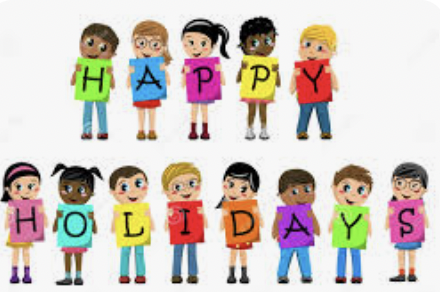7C2 Science
Section outline
-
-
Opened: Saturday, 8 June 2024, 12:00 AMDue: Tuesday, 18 June 2024, 12:00 AM
-
Opened: Monday, 23 September 2024, 12:00 AMDue: Tuesday, 30 September 2025, 1:00 AM
For the purpose of this assessment students will illustrate a diagram of the water cycle inclusive of all the processes involved. Students will also investigate the impacts that climatic conditions such as droughts/floods have on the environment.
-
-
Kia Ora Students,
Welcome to Coast Whanau, my name is Mrs A Naidoo and I will be teaching you Science. We begin the year with the topic Aotearoa and we will explore our surrounding ecosystems with a focus on Takutai.EXPLORE / TŪHURA learning intentions:
- We are EXPLORING... the context of ‘Aotearoa, the home we make it to be where everyone counts’ by discovering our surrounding ecosystems.
SC:
Describe what an ecosystem is
Identify the living and nonliving components in an ecosystem.
Research and summarise information.
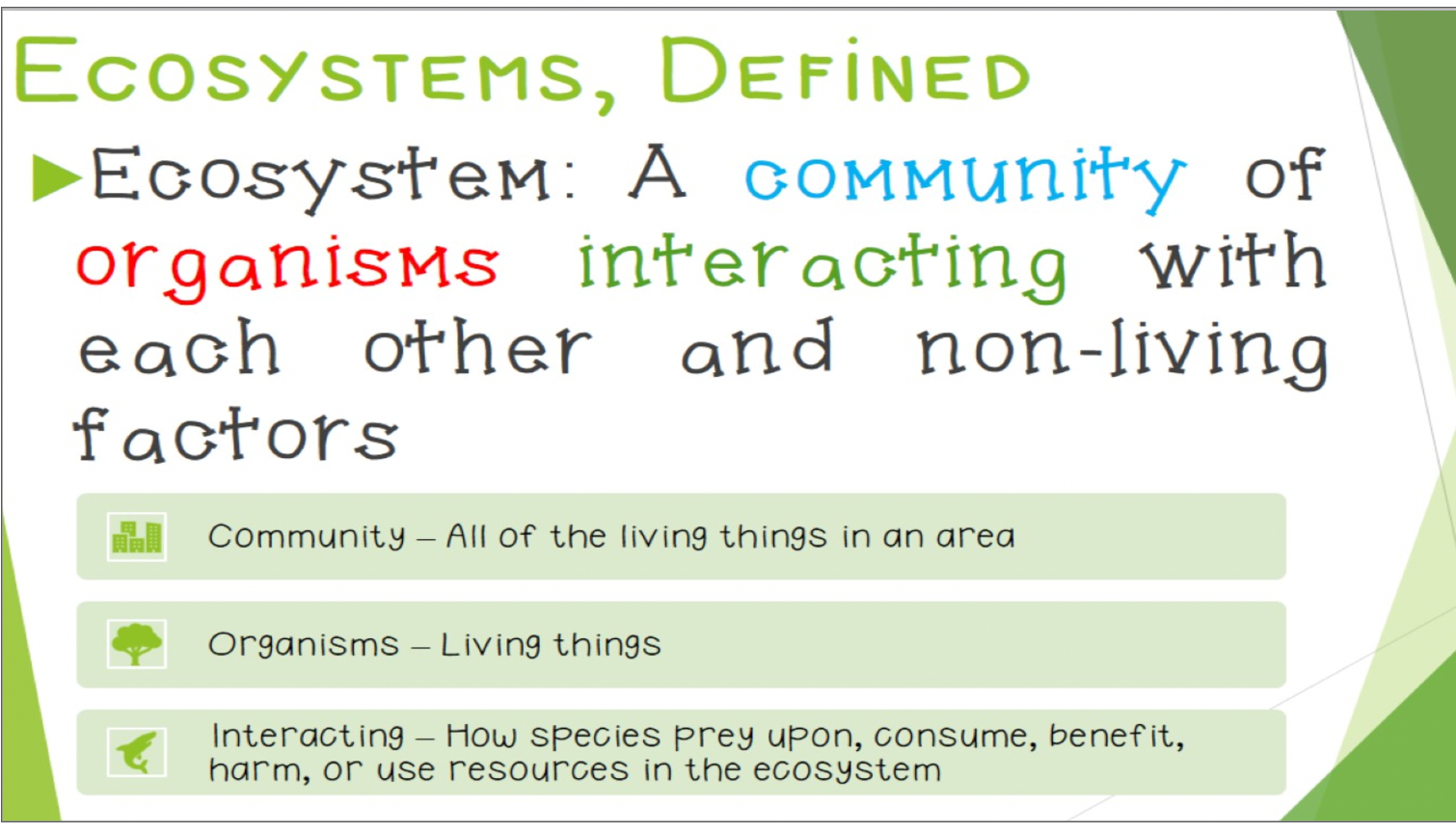
- We are EXPLORING... the context of ‘Aotearoa, the home we make it to be where everyone counts’ by discovering our surrounding ecosystems.
-
Kia Ora Students,
Week 3, we will continue working on the Ecosystem slides.
EXPLORE / TŪHURA learning intentions:
- We are EXPLORING... the context of ‘Aotearoa, the home we make it to be where everyone counts’ by discovering our surrounding ecosystems.
SC:
Describe what an ecosystem is
Identify the living and nonliving components in an ecosystem.
Research and summarise information.
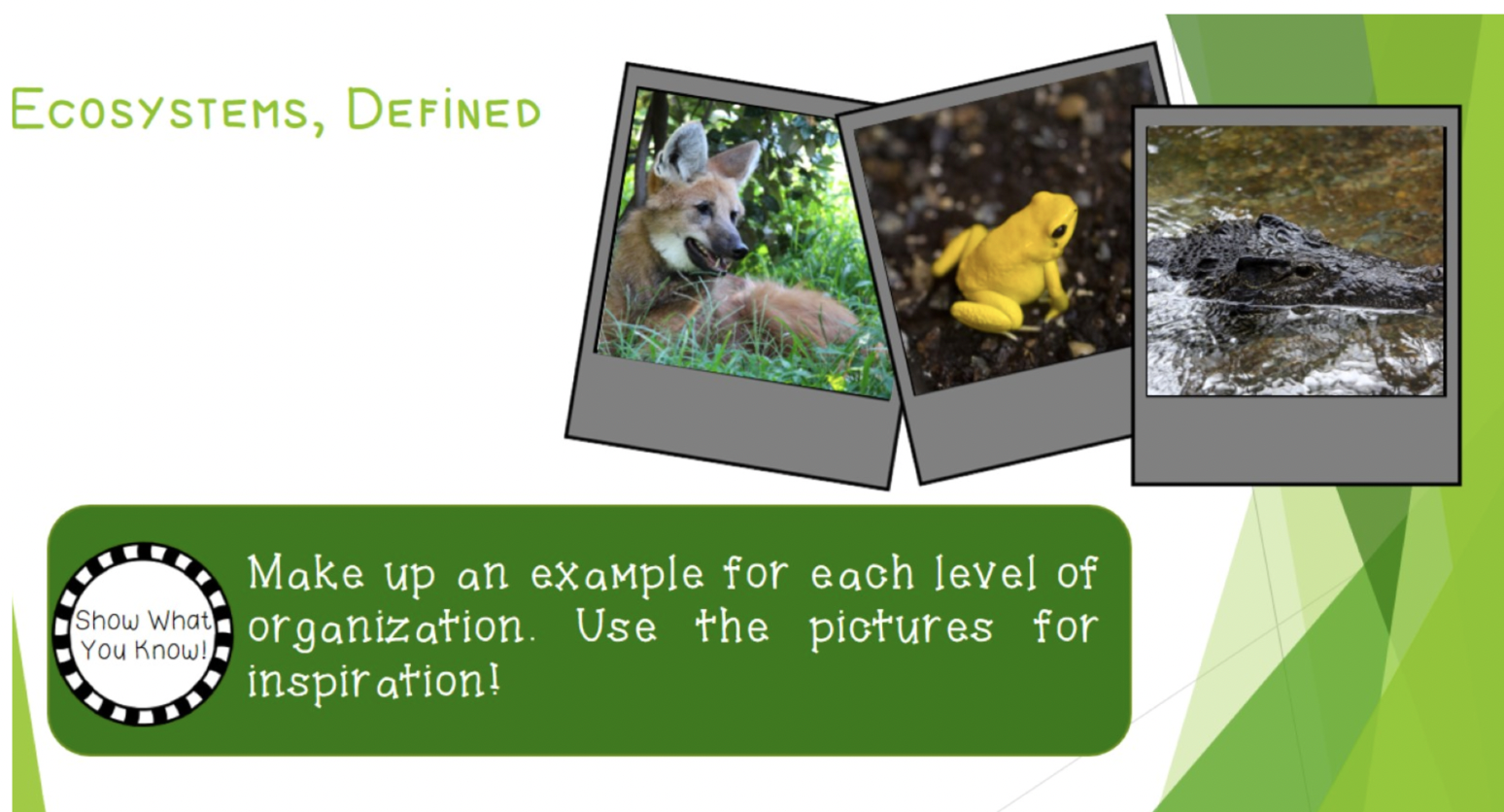
- We are EXPLORING... the context of ‘Aotearoa, the home we make it to be where everyone counts’ by discovering our surrounding ecosystems.
-
Kia Ora Students,
This week we are looking at the interactions of organisms within various habitats.EXPLORE / TŪHURA learning intentions:
- We are EXPLORING...the context of identity in Aotearoa by looking at the interactions of organisms in communities.
SC:Compare and contrast different ecosystems.
Identify producers, and consumers.
State the effects of human influence on natural habitats.
Complete the Brainpop
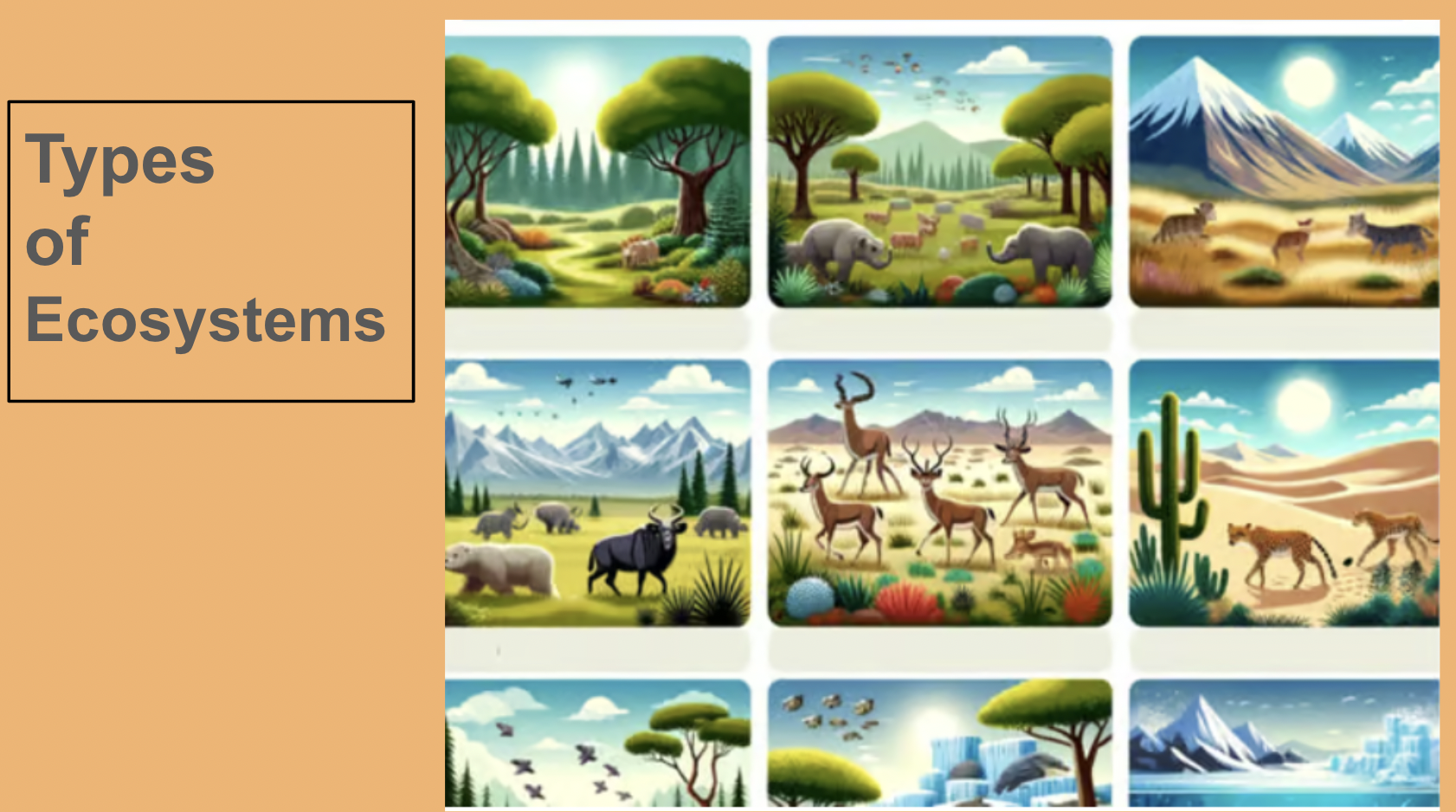
-
FOCUS / ARONGA learning intentions:
- We are FOCUSING...On Identities and communities by learning how to work and use lab equipment correctly.
SC:
1. Follow the safety rules in the lab.
2. Identify the parts of a microscope and how to use the microscope.
Activities:
1. Play the lab safety game.
2. https://www.flinnsci.com/api/library/Download/ded4c367162d40328a101f77ce9a3eec
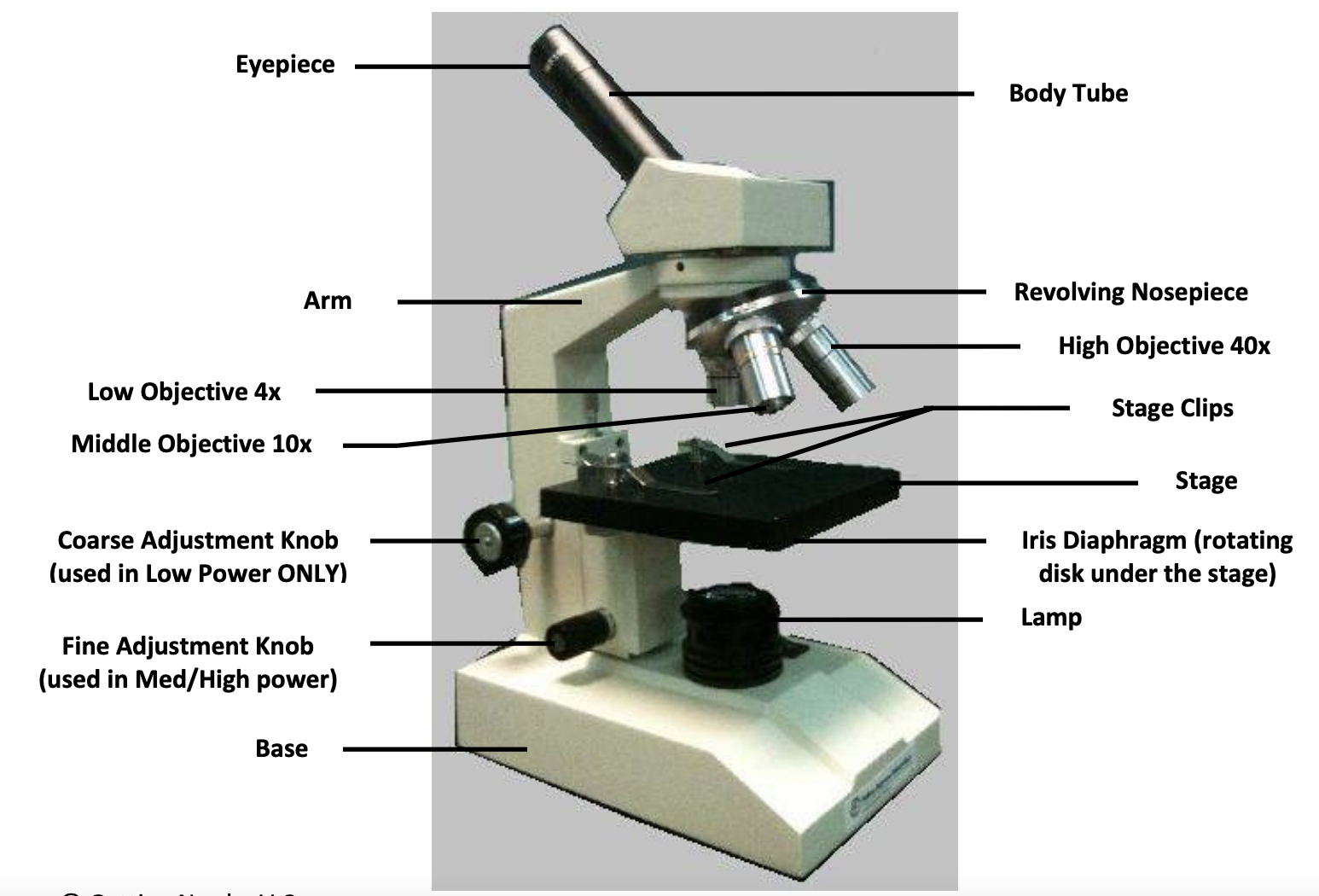
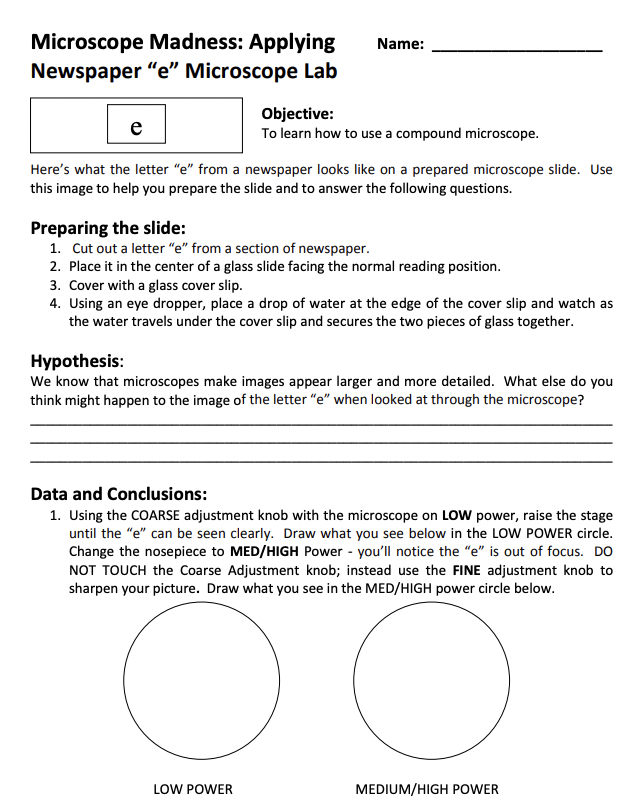
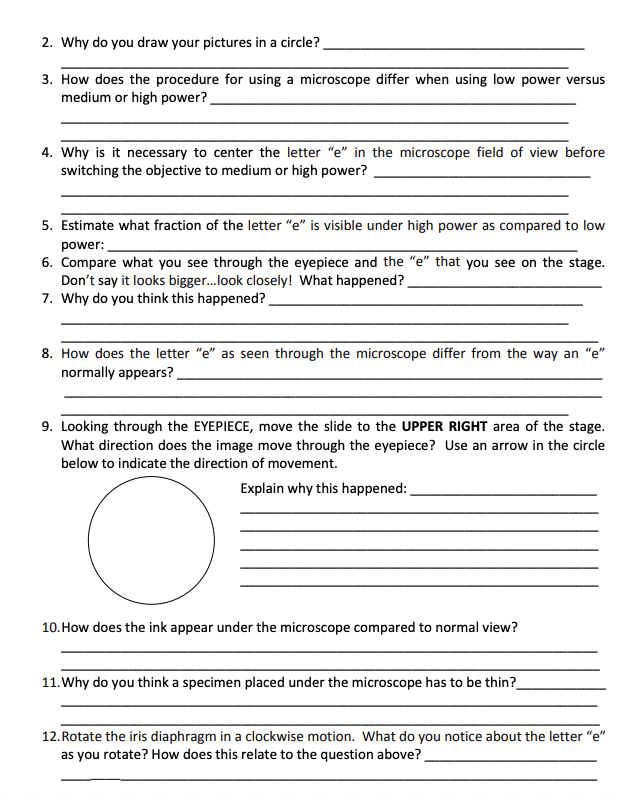
-
Kia Ora Students,Week 6 focus will be on National Sea week and learning about our oceans.
FOCUS / ARONGA learning intentions:
- We are FOCUSING... on the oceans and the importance of sustaining them.
SC:
Explain the importance of Sea Week.
Complete a simple experiment by following instructions.
Recognise the layers of the ocean and classify which organisms live in each layer.
Compare the density of different liquids.
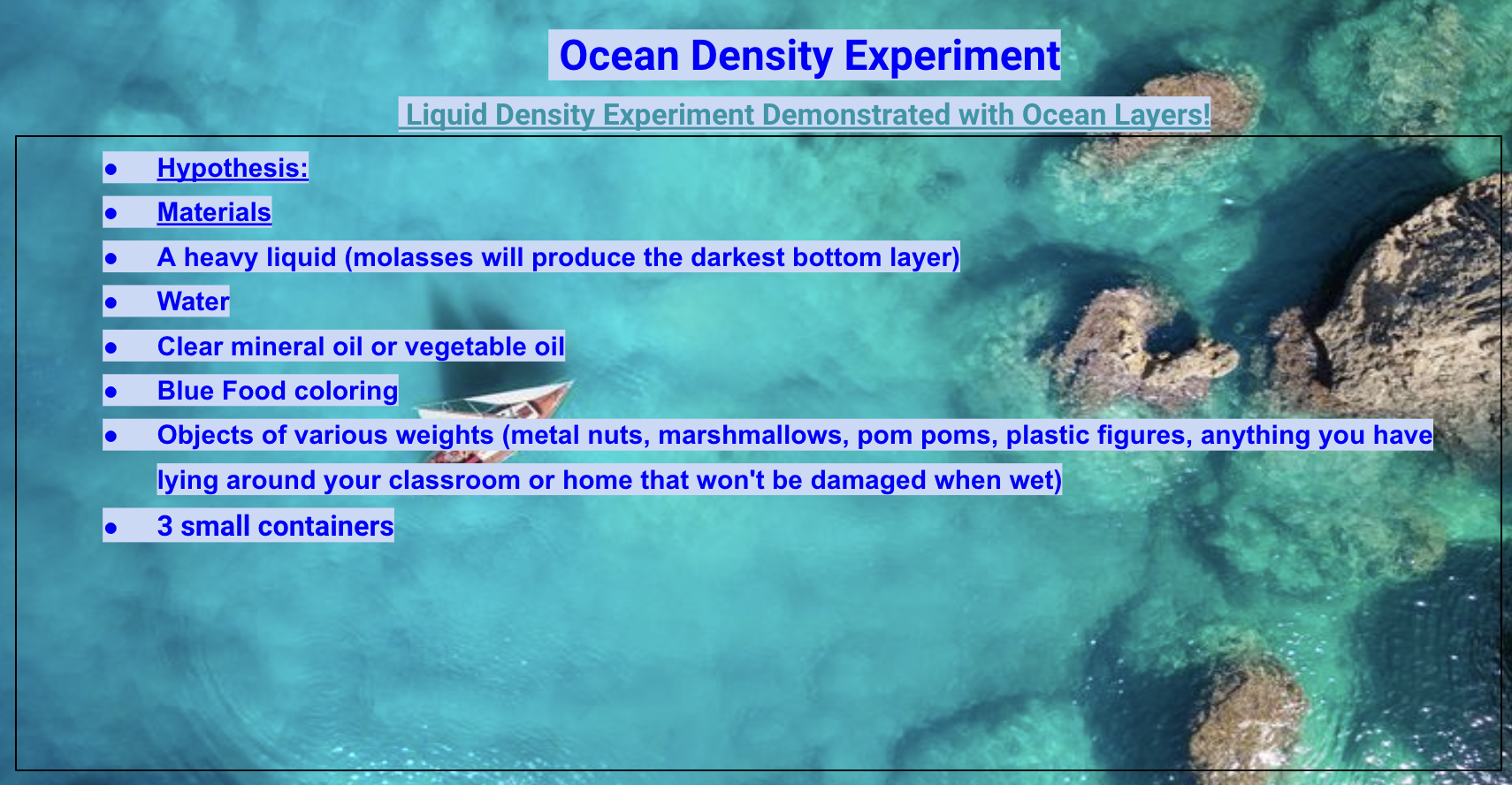
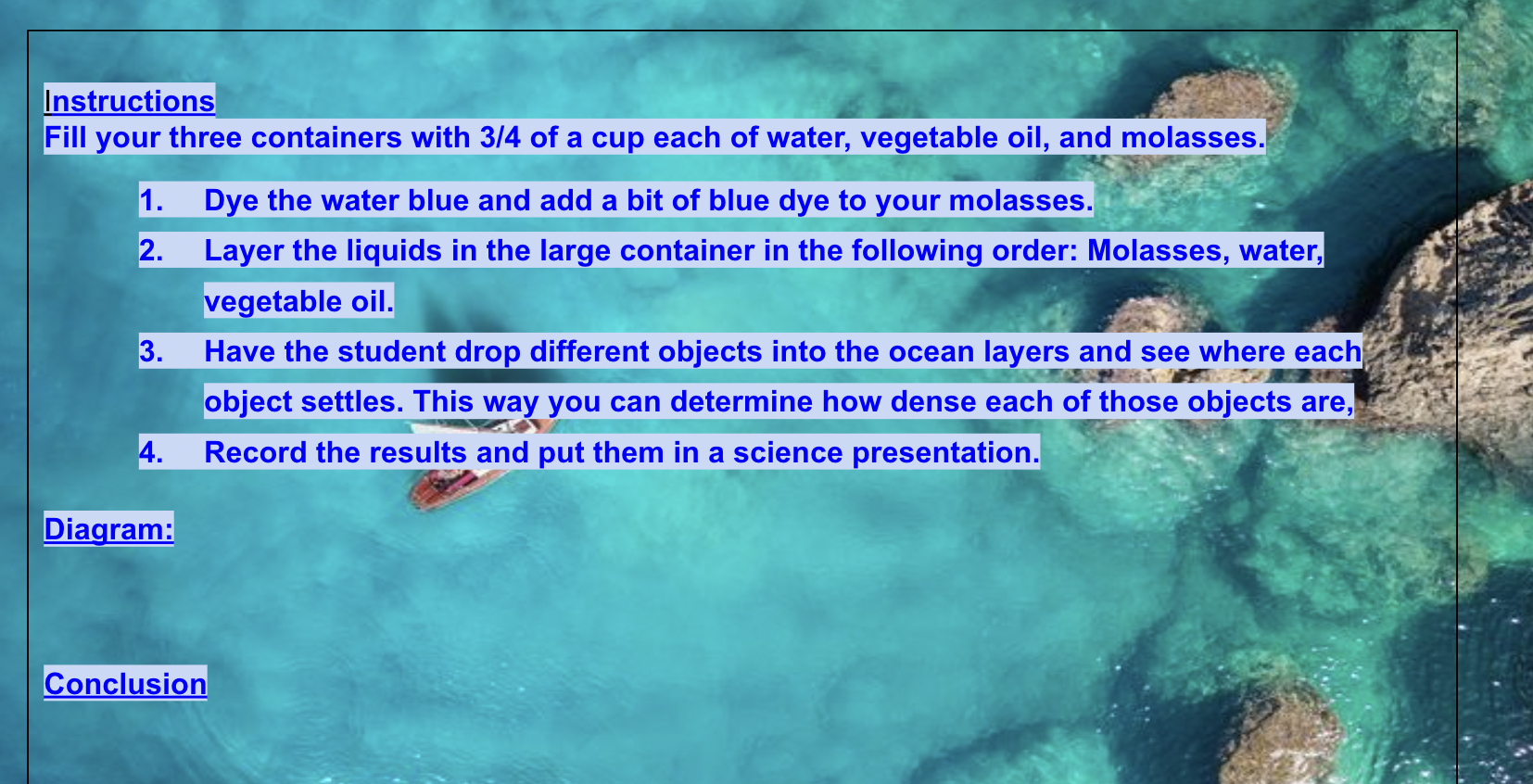
- We are FOCUSING... on the oceans and the importance of sustaining them.
-
Kia Ora Students,
We are continuing with our learning about the oceans, this week we will be learning about the coral reefs.
PLAN & DO / WHAKAMAHI learning intentions:
- We are PLANNING...investigate the effects of pollution on our coral reefs so that we can...protect our natural ecosystems.
SC:
Hypothesise and observe during science investigations.
Compare the effects of acidification on coral by using seashells.
Explain what polyps are.
Discuss the effects of pollution on the ocean and find solutions with my peers.
Summarise information-importance of reefs.
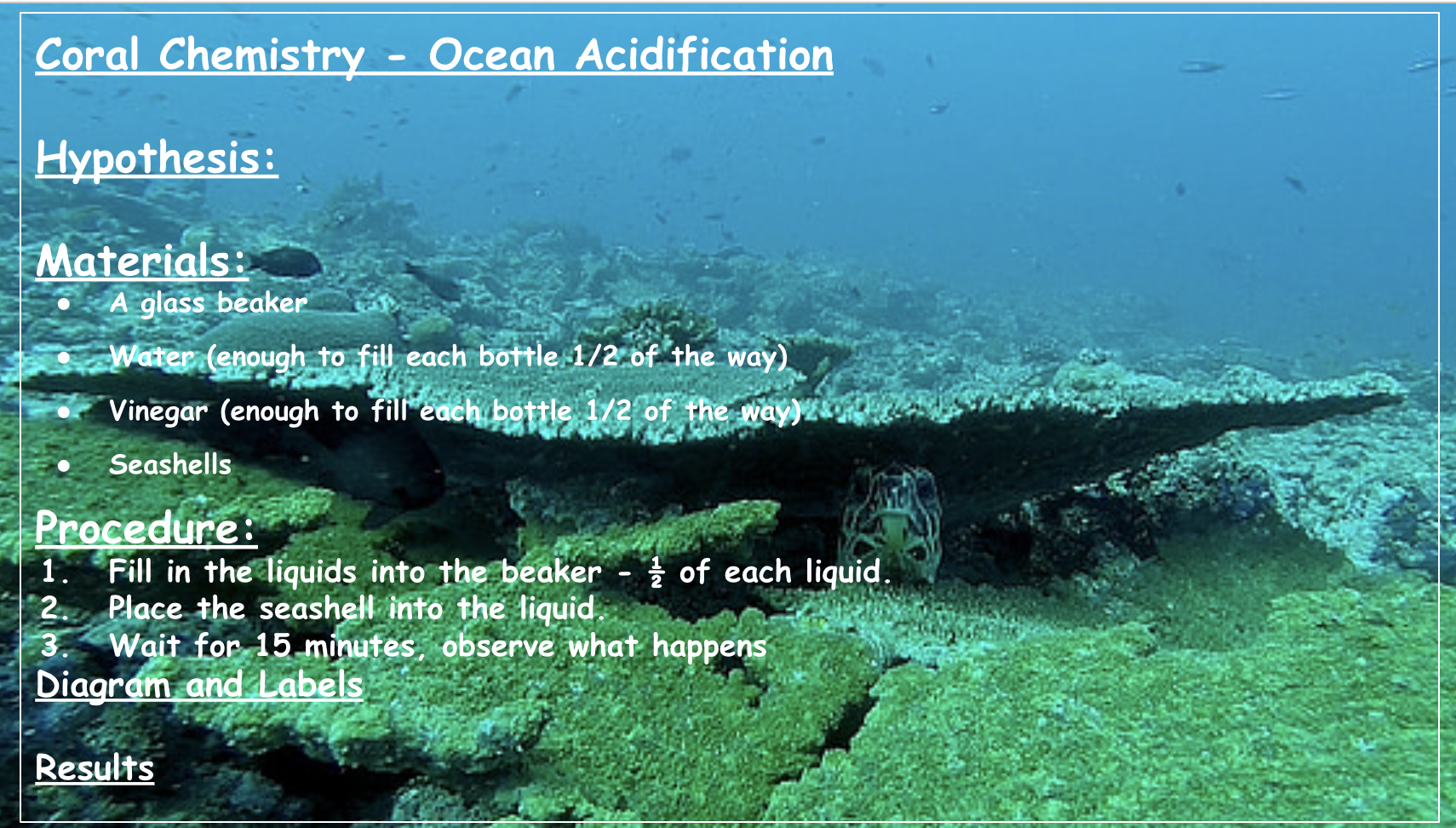
-
Welcome Students to week 8 of our Science Learning.
PLAN & DO / WHAKAMAHI learning intentions:
- We are PLANNING... conduct investigations about acids and bases so that we can...understand the composition of different subatances and their effects.
- SC
Hypothesise and observe during science investigations.
Summarise information-importance of reefs.
Test the PH of different substances.
Draw conclusions from the results of investigation.
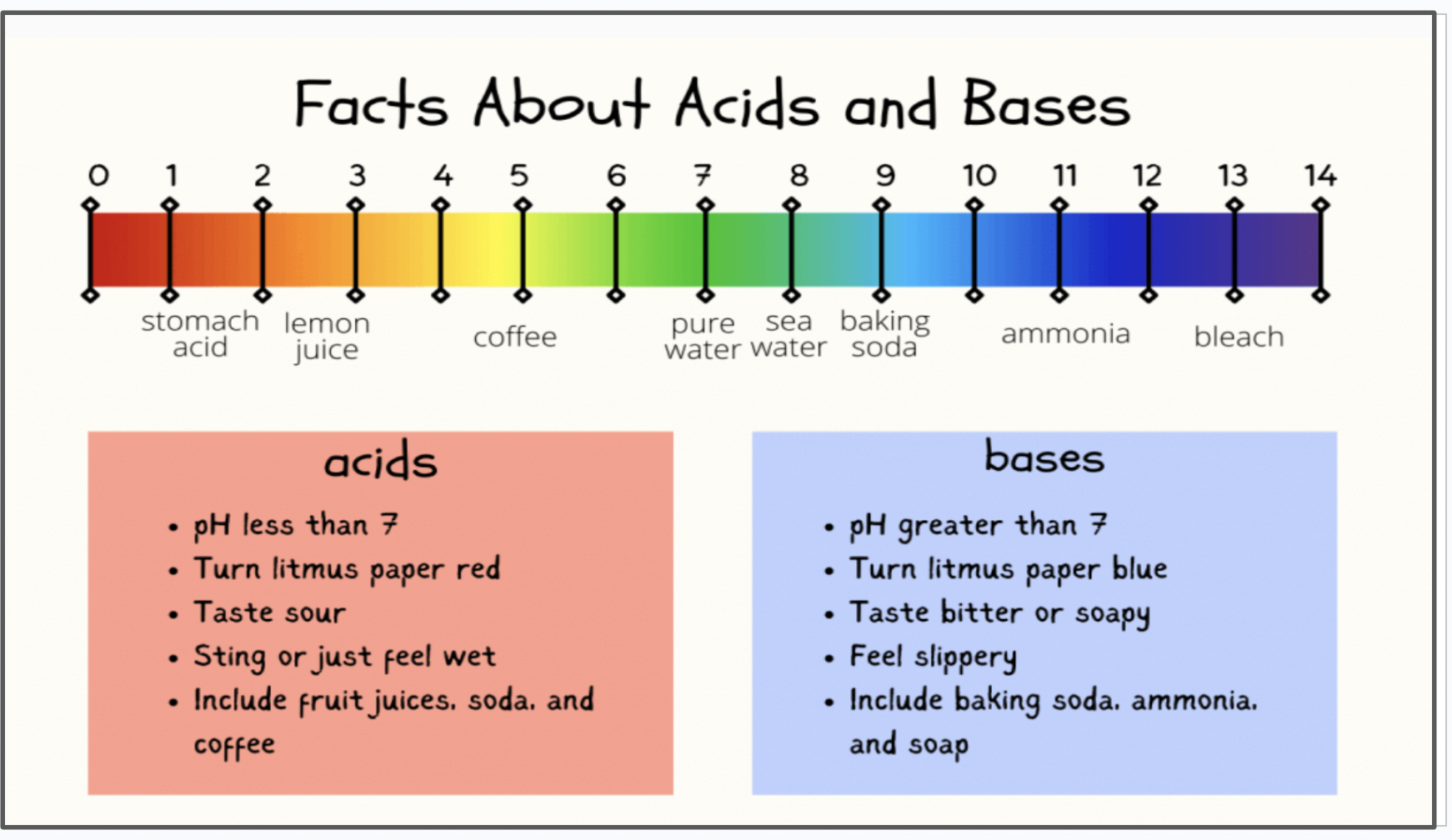
-
Welcome Students to week 9 of our Science Learning.
PLAN & DO / WHAKAMAHI learning intentions:
- We are PLANNING... to research native sea animals so that we can...understand, appreciate and sustain marine life.
- SC
Summarise information and write it in my own words.
Select appropriate information.
Draw and label a marine animal.
Create a brochure by following prompts.
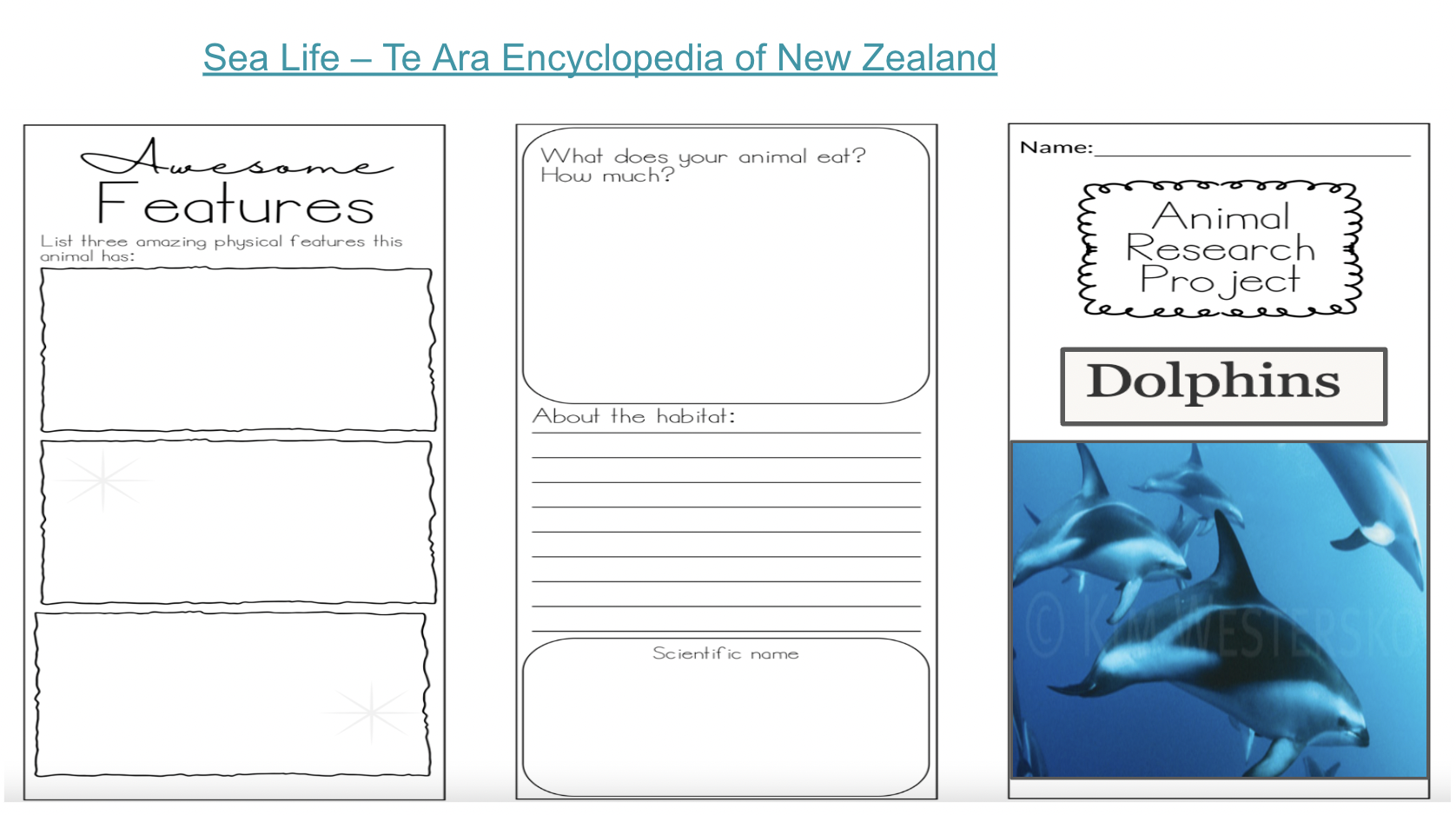
-
Kia Ora Students
This is a short week so we will focus on tides.
FOCUS / ARONGA learning intentions:
- We are FOCUSING..tides so that we can understand the relation of the moon to the earth and the effects on the planet.
SC: Draw and label the map of NZ including the surrounding oceans.
Identify the average temperatures of the oceans.
Explain what causes high and low tides.
Enter text here...
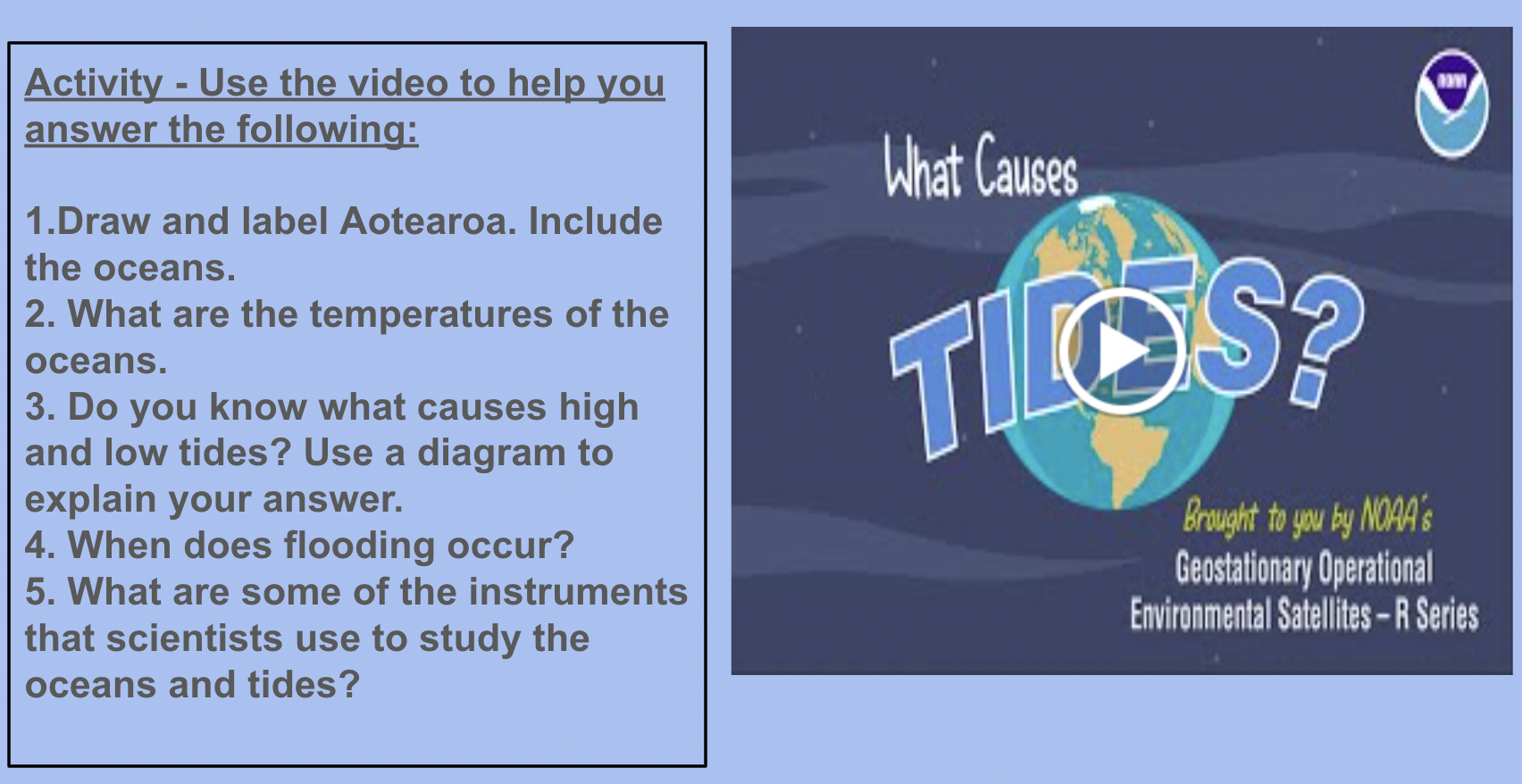
- We are FOCUSING..tides so that we can understand the relation of the moon to the earth and the effects on the planet.
-
Morena Students
FOCUS / ARONGA learning intentions:
- We are FOCUSING... on taking care of our oceans by identifying the causes of sea pollution.
SC: - 1. Conduct an investigation - water pollution.
- 2. Record my results and draw conclusions.
- 3. Identify the main causes of pollution and find solutions.
Google Classroom - Link to Activities
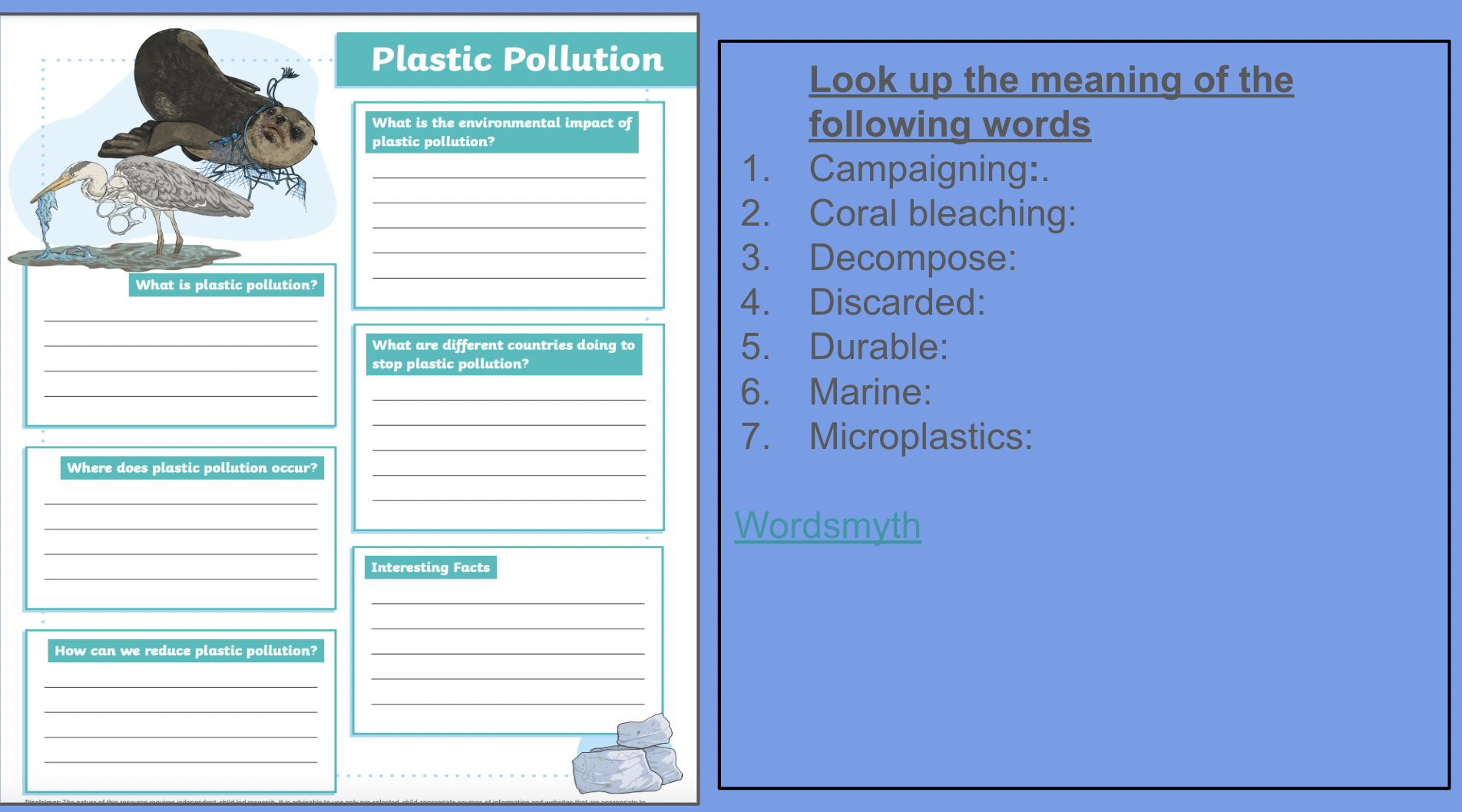
- We are FOCUSING... on taking care of our oceans by identifying the causes of sea pollution.
-
Kia Ora Students, welcome back. Our context for term two is:
EXPLORE / TŪHURA learning intentions:
- We are EXPLORING... the context of ‘Stand up, stand out’ by identifying and developing our STEM skills.
SC:
Identify my STEM interest(science/math/technology) by completing a rocket challenge survey to
Find out where in NZ rocket launching occurs and why.
Discuss and apply some of the key STEM skills ākonga will need to harness for the challenge.
Describe what an engineer does.
Compare and contrast different types of engineers.
Design a rocket prototype by following the steps of the design process.
Activities-Link to Google Classroom
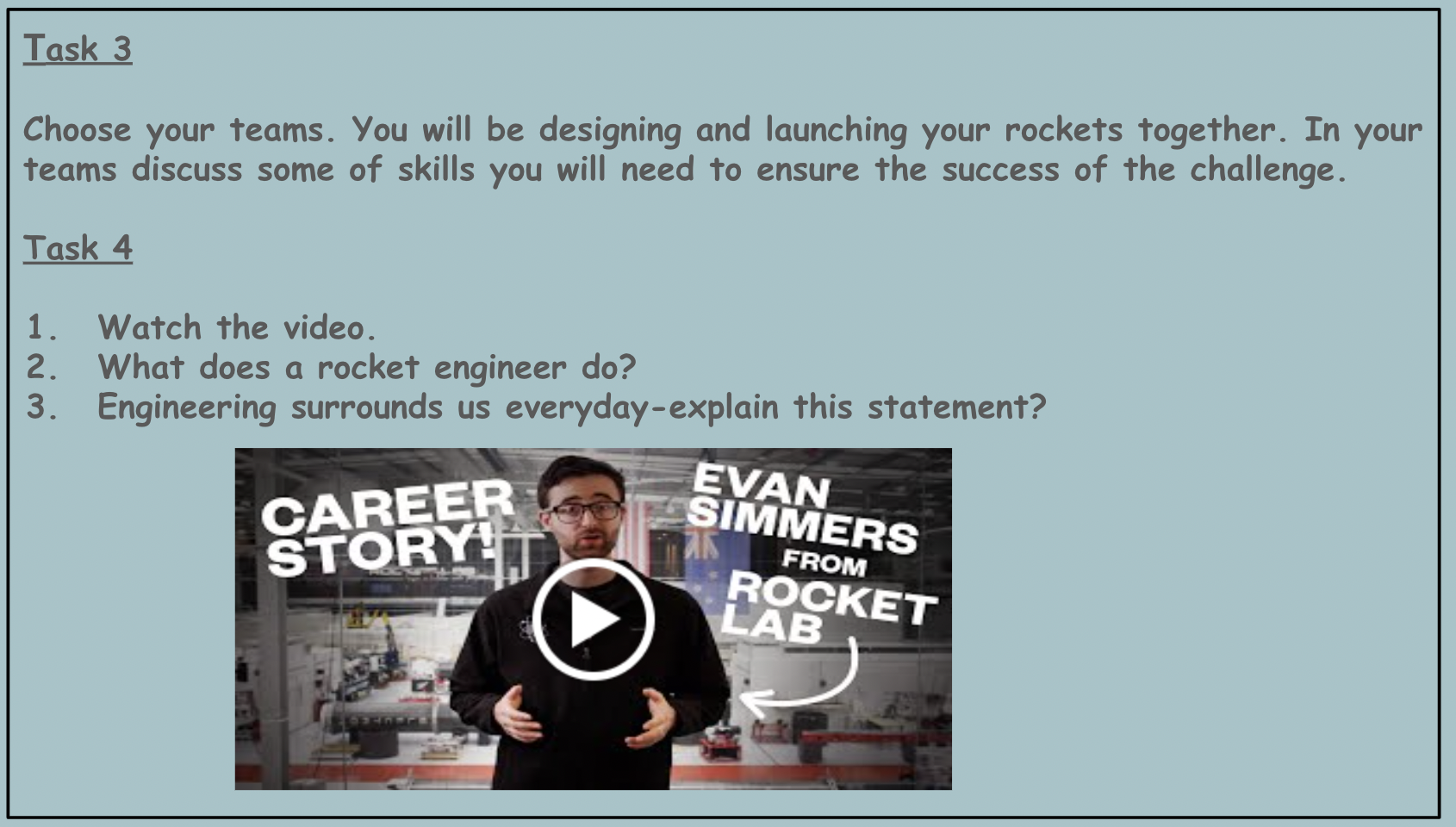
- We are EXPLORING... the context of ‘Stand up, stand out’ by identifying and developing our STEM skills.
-
Kia Ora Students, Welcome to Week 2,
EXPLORE / TŪHURA learning intentions:
- We are EXPLORING... the context of ‘Stand up, Stand out, by examining the benefits of rockets and space exploration.
- Success Criteria
Identify the basics of how to launch a rocket
Apply the health and safety rules and plan risk mitigations
Discover the concept of variables
Perform the first test launch and explore the outcome of changing the water level variable
Use metric units to find the volume of water to add to rockets
Analyse flight data to find the optimum water level for flight
Google Classroom - Link to Activities
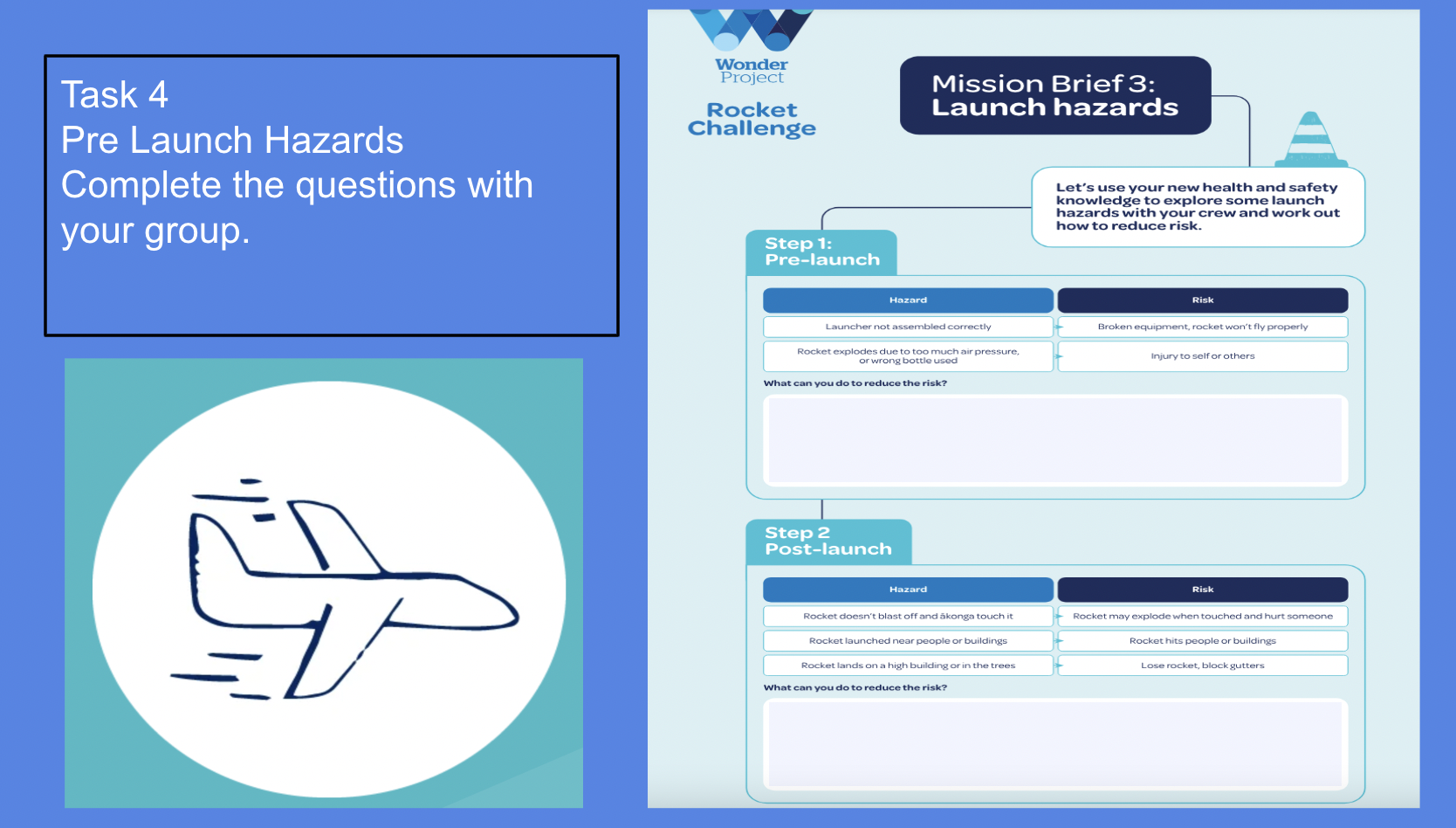
- We are EXPLORING... the context of ‘Stand up, Stand out, by examining the benefits of rockets and space exploration.
-
Kia Ora Students,
This week we will look at the forces involved in rocket launching.
FOCUS / ARONGA learning intentions:
- We are FOCUSING... on the context of ‘Empowerment’ by identifying the forces involved in flight.
Success Criteria:
Test Newton’s first law.
Conduct practical investigations involving forces and record observations.
Evaluate the initial flight - identify problems of the rocket design.
Plan, design and construct a rocket - improving on the prototype.
Google Classroom - Link to Activities
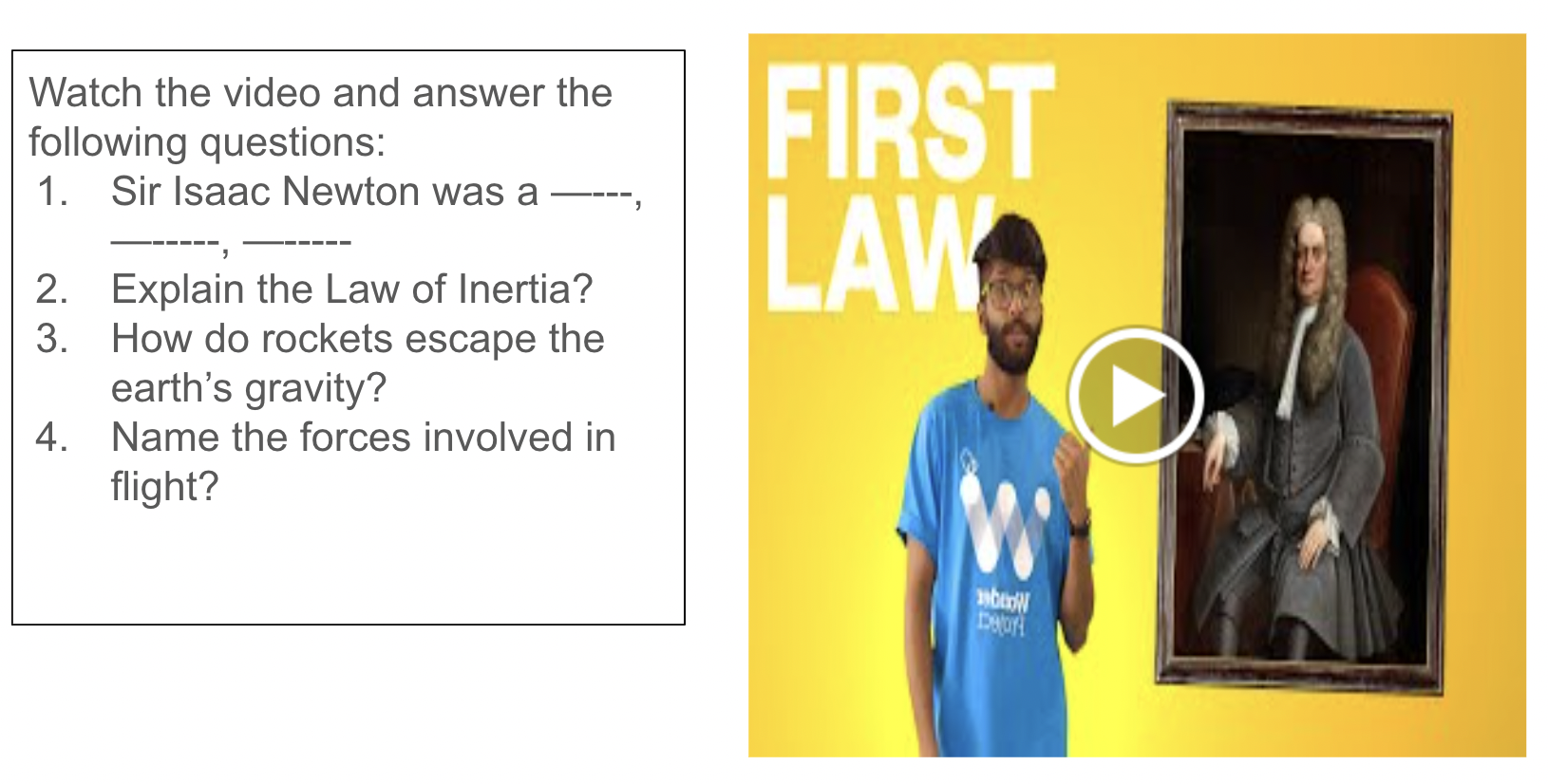
- We are FOCUSING... on the context of ‘Empowerment’ by identifying the forces involved in flight.
-
Kia Ora Students,
This week we will look at the forces that surround us.
Success Criteria:
Test Newton’s first law.
Conduct practical investigations involving forces and record observations.
Plan, design and construct a rocket - improving on the prototype.
Google Classroom - Link to Activities
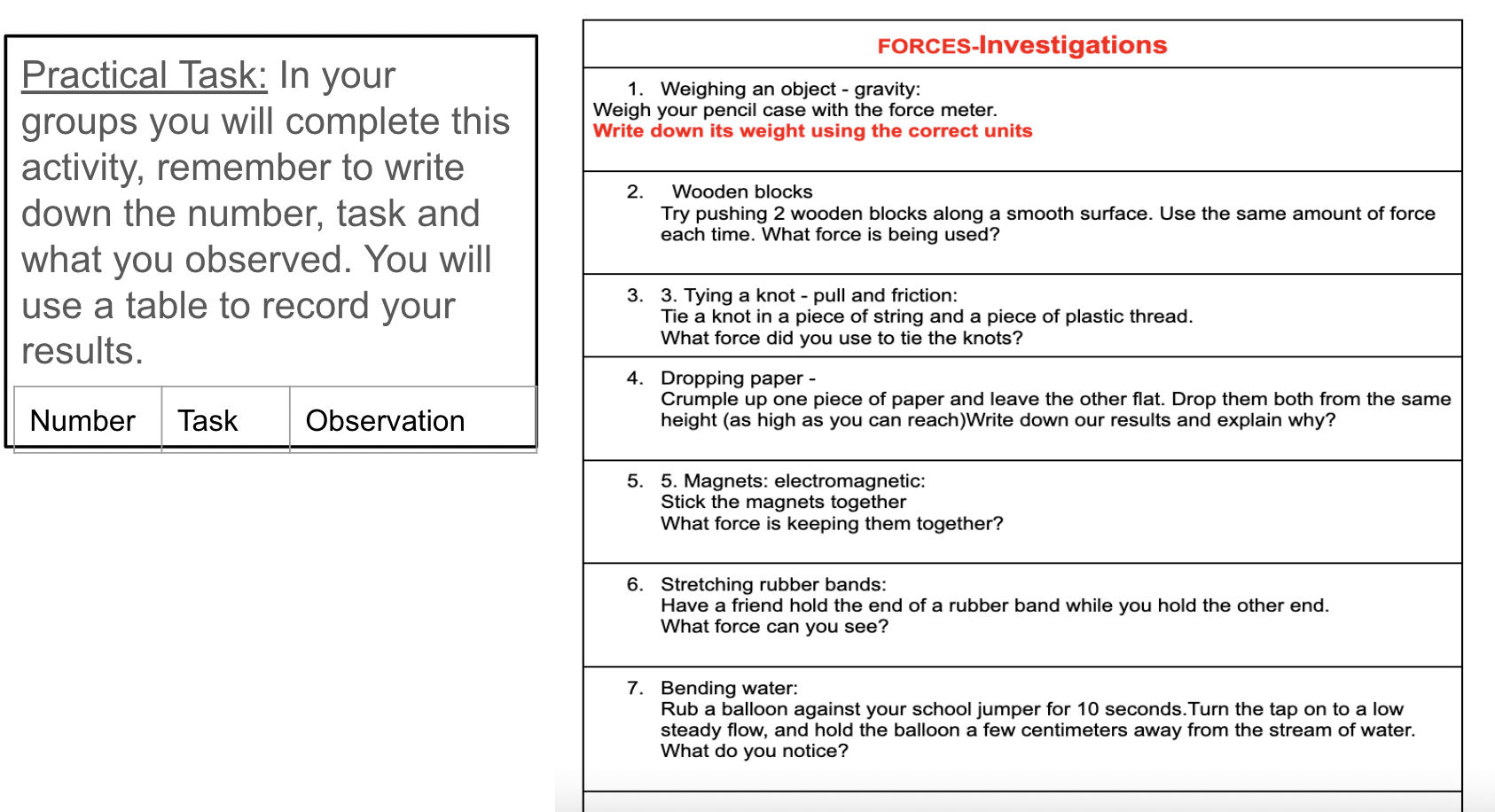
-
Kia Ora Students,
PLAN & DO / WHAKAMAHI learning intentions:
- We are PLANNING...to consolidate our learning on Newton's First Law
so that we can...apply these concepts on the rockets.
Success Criteria
1. Reflect and improve my rocket.
2. Investigate the impact of forces and their effects.
3. Identify and describe the forces necessary for flight.
- We are PLANNING...to consolidate our learning on Newton's First Law
-
PLAN & DO / WHAKAMAHI learning intentions:
- We are PLANNING... to apply our knowledge of Newton's second law on our rocket prototypes so that we can make improvements in the thrust and flight.
Success Criteria
Describe how aerodynamics affects the forces of flight.
Design a rocket prototype based on my knowledge of aerodynamics.
Evaluate and test rocket fitness of purpose and stability.
Reflect and improve my rocket.
Investigate the impact of forces and their effects
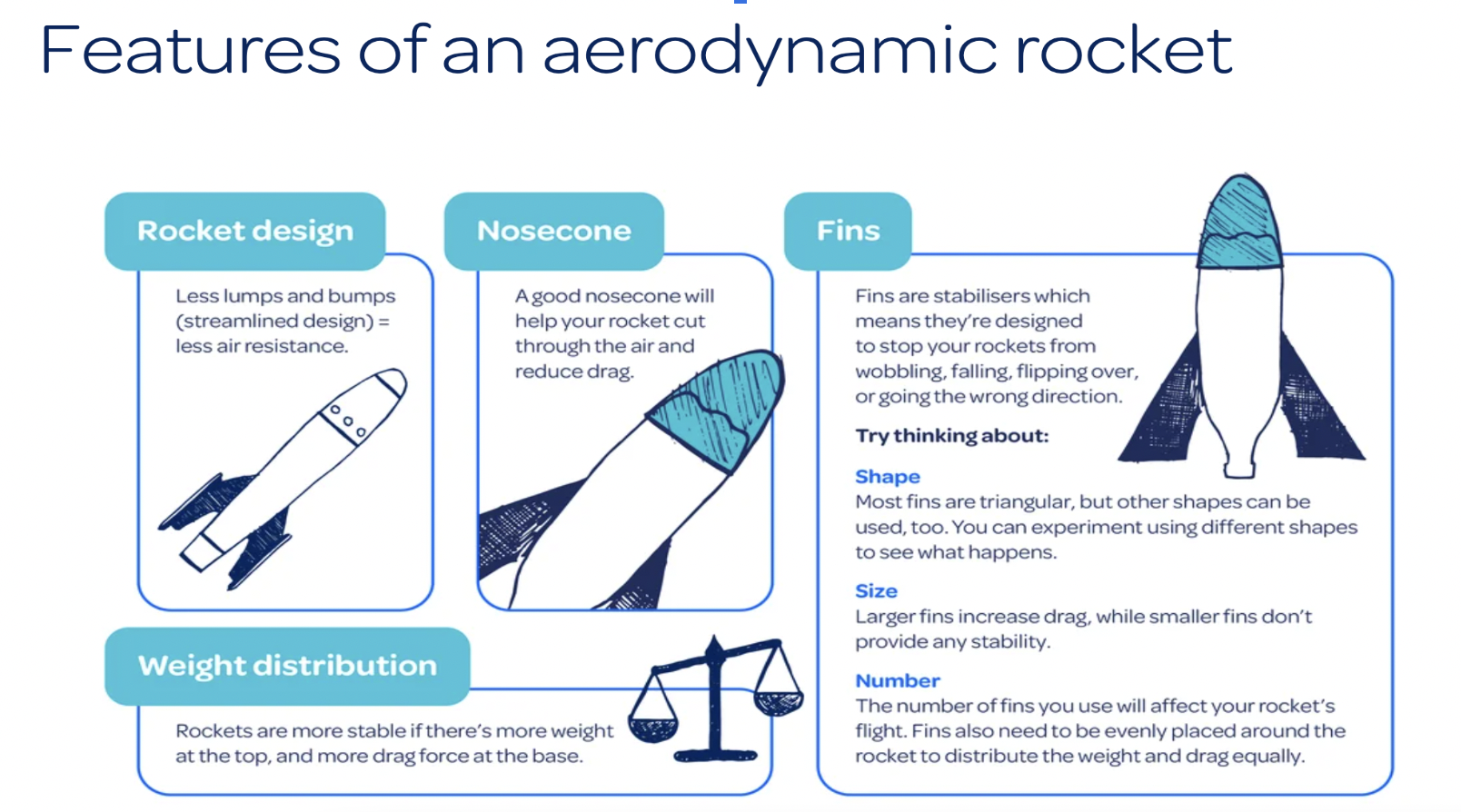
- We are PLANNING... to apply our knowledge of Newton's second law on our rocket prototypes so that we can make improvements in the thrust and flight.
-
PLAN & DO / WHAKAMAHI learning intentions:
- We are PLANNING...to apply our knowledge of Newton's Third Law so that we can...improve the thrust and flight of our rockets.
Success Criteria
Describe how aerodynamics affects the forces of flight.
Reflect and improve my rocket.
Investigate the impact of forces and their effects
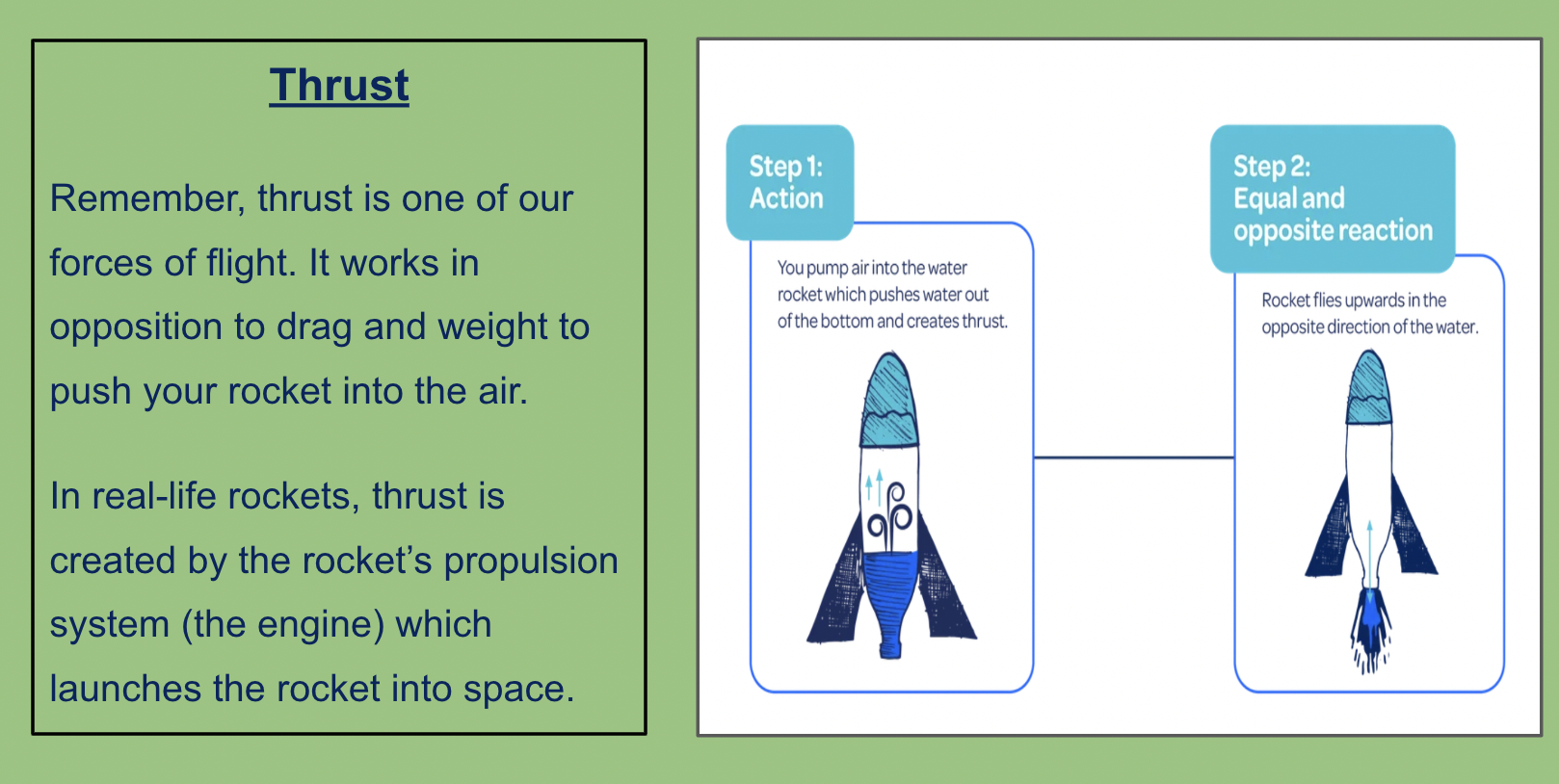
-
Kia Ora Students,
PLAN & DO / WHAKAMAHI learning intentions
We are PLANNING..to design a brochure of Sir Isaac Newton so that we can..deepen our understanding of his contribution to science and society.
Success Criteria
Identified 3 of his discoveries to science.
Outlined his life journey: included information about his personal life.
Selected and organised relevant pictures and information.
Proofread my poster for grammar, spelling and punctuation.
- Google Classroom - Link to Activities
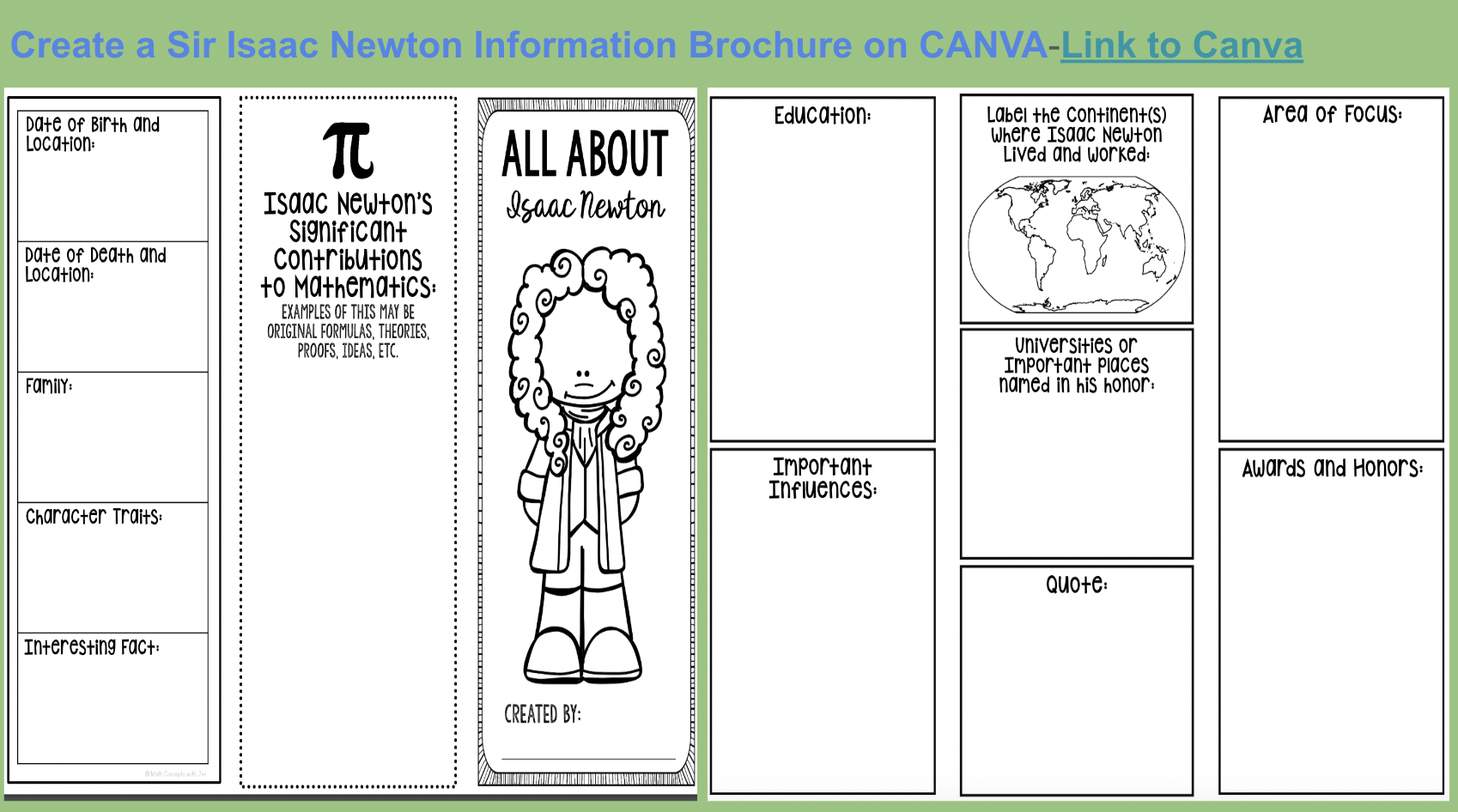
-
Enjoy the Holidays, keep warm.
-
Enjoy the Holidays, keep warm.
-
Kia Ora Students,
Welcome back to Term 3.
EXPLORE / TŪHURA learning intentions:
- We are EXPLORING... the context of "How human events may promote kotahitanga" by identifying forms of Energy.
- Success Criteria
Explain what energy is.
Identify the properties of energy.
Name the various types of energy.
Compare and contrast potential and kinetic energy and give examples.
Google Classroom - Link to Activities
- We are EXPLORING... the context of "How human events may promote kotahitanga" by identifying forms of Energy.
-
Kia Ora Students,
EXPLORE / TŪHURA learning intentions:
- We are EXPLORING...the context of ‘kotahitanga’ by investigating how energy is transformed from one form to another.
Success Criteria
Examine energy transformations in the Lab.
Describe the steps needed to conduct the investigations and record results.
Compare and explain the types of energy transferred in each investigation.
Google Classroom - Link to Activities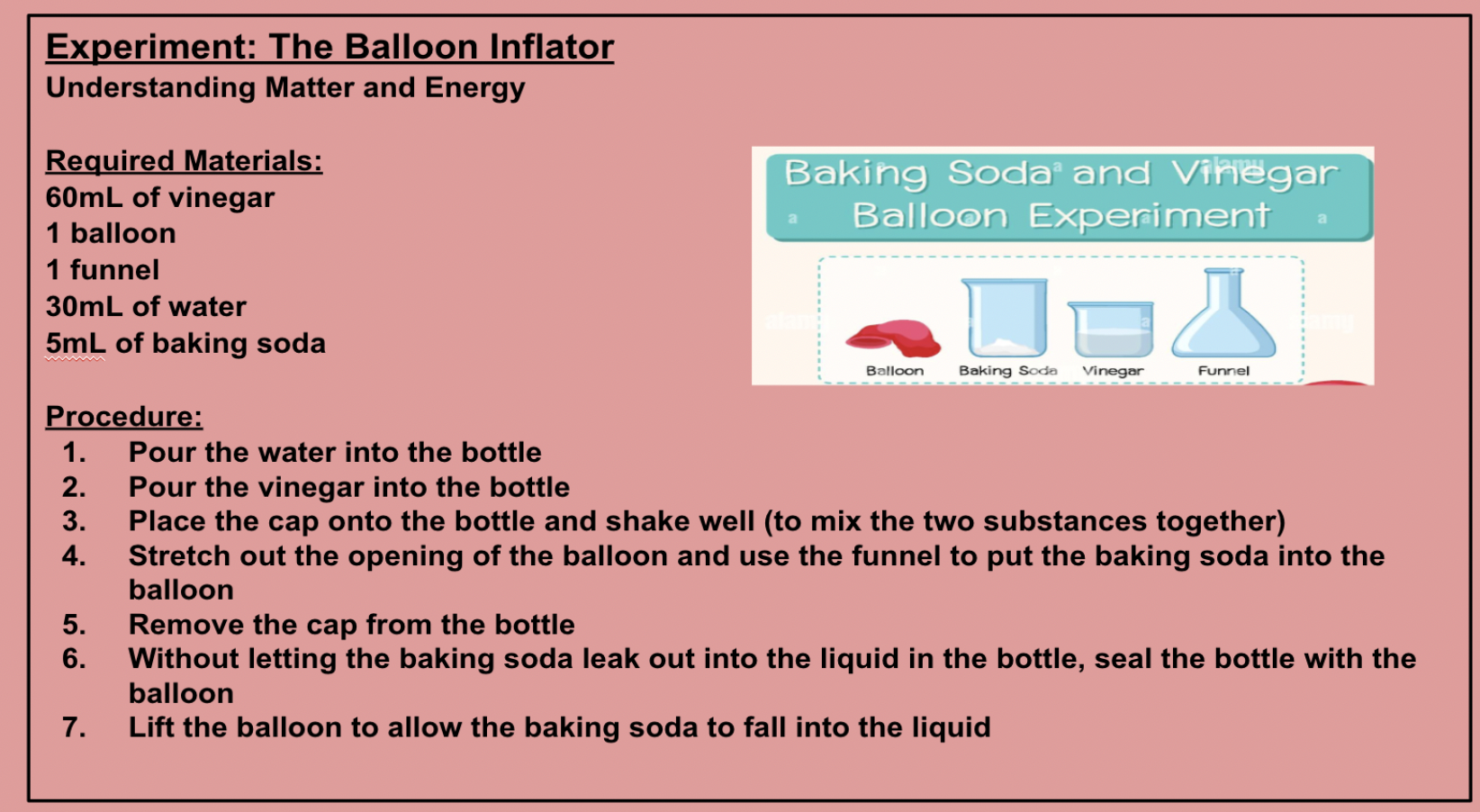
-
FOCUS / ARONGA learning intentions:
- We are FOCUSING... the context of “kotahitanga’by examining how the different types of energies are dependent on one another.
Success Criteria
Hypothesise and justify my reasoning during science investigations.
Identify and explain how mechanical energy occurs.
Construct energy chains to explain my thinking.
Google Classroom - Link to Activities
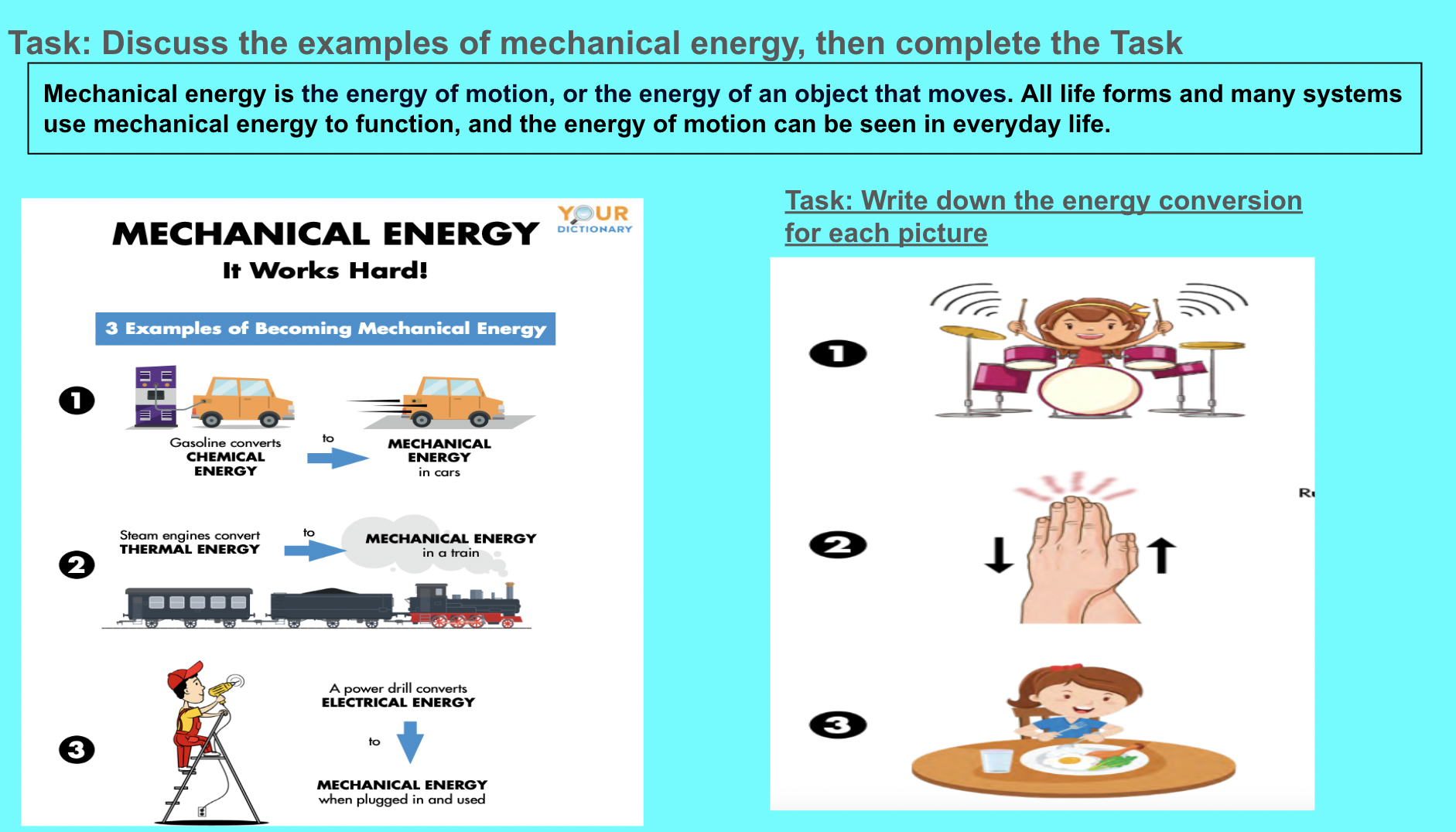
- We are FOCUSING... the context of “kotahitanga’by examining how the different types of energies are dependent on one another.
-
Kia Ora Students,
FOCUS / ARONGA learning intentions:
- We are FOCUSING...on the context of “kotahitanga” by examining how our actions directly affect the sustainability of natural resources.
- Success Criteria
Investigate energy sources and usage in New Zealand
Categorise the use/sources of energy according to the least/most efficient.
Draw energy trains from the source to the output.
Identify sources of heat energy and explain how the transfer occurs(conduction/convection/radiation)
Construct a Bar Graph to show energy efficiencies.
Describe the steps needed to conduct the investigations and record results.
Google Classroom - Link to Activities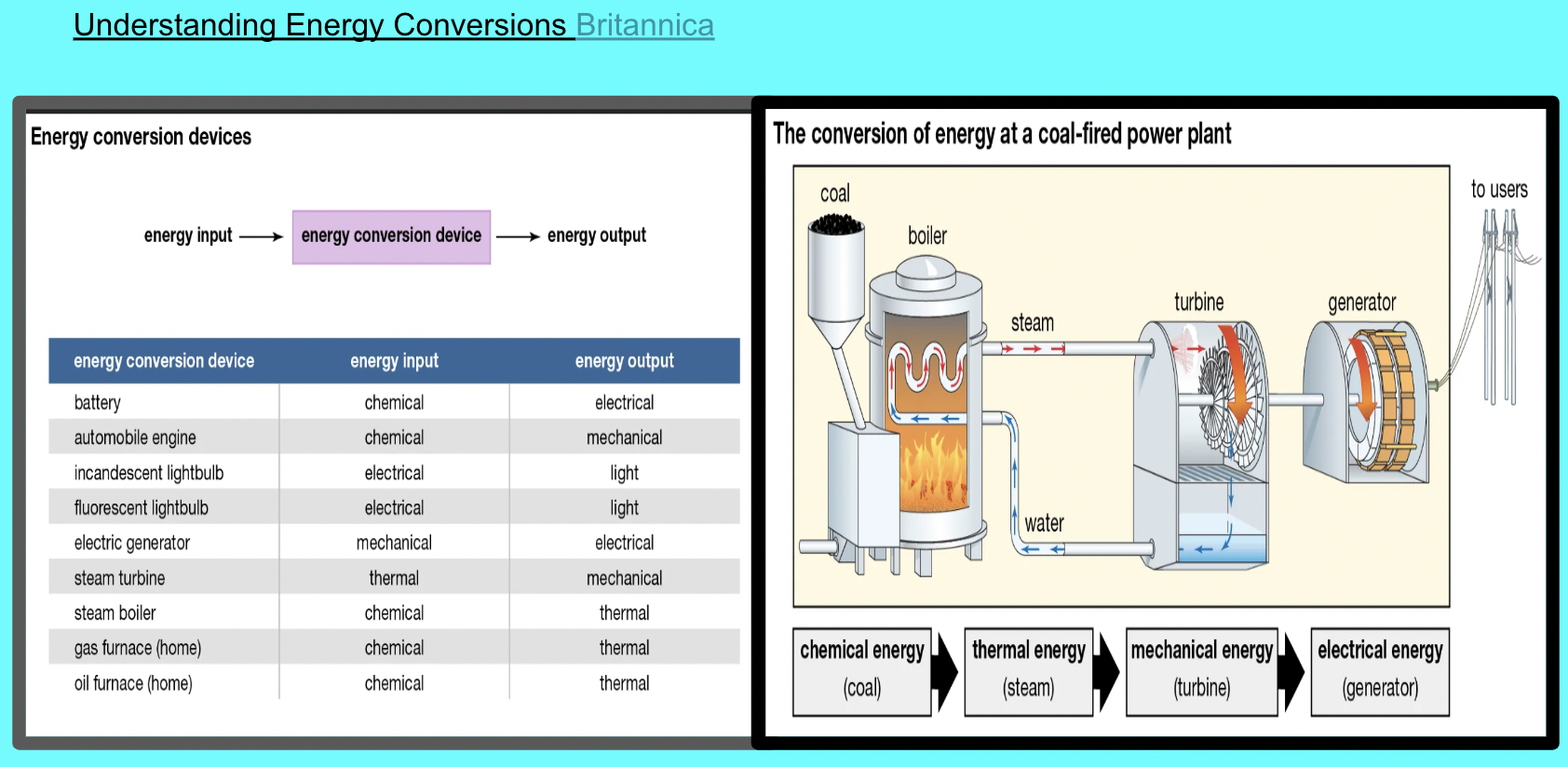
- We are FOCUSING...on the context of “kotahitanga” by examining how our actions directly affect the sustainability of natural resources.
-
Kia Ora Students,
EXPLORE / TŪHURA learning intentions:
- We are EXPLORING... the context of ‘kotahitanga’ by investigating how our actions effect our Natural Resources, Water.
- Success Criteria
Compare rainfall in different parts of NZ and plot the results in a graph.
State and illustrate each part of the water cycle.
Describe each stage with examples.
Conduct an experiment and explain the results.
Google Classroom - Link to Activities
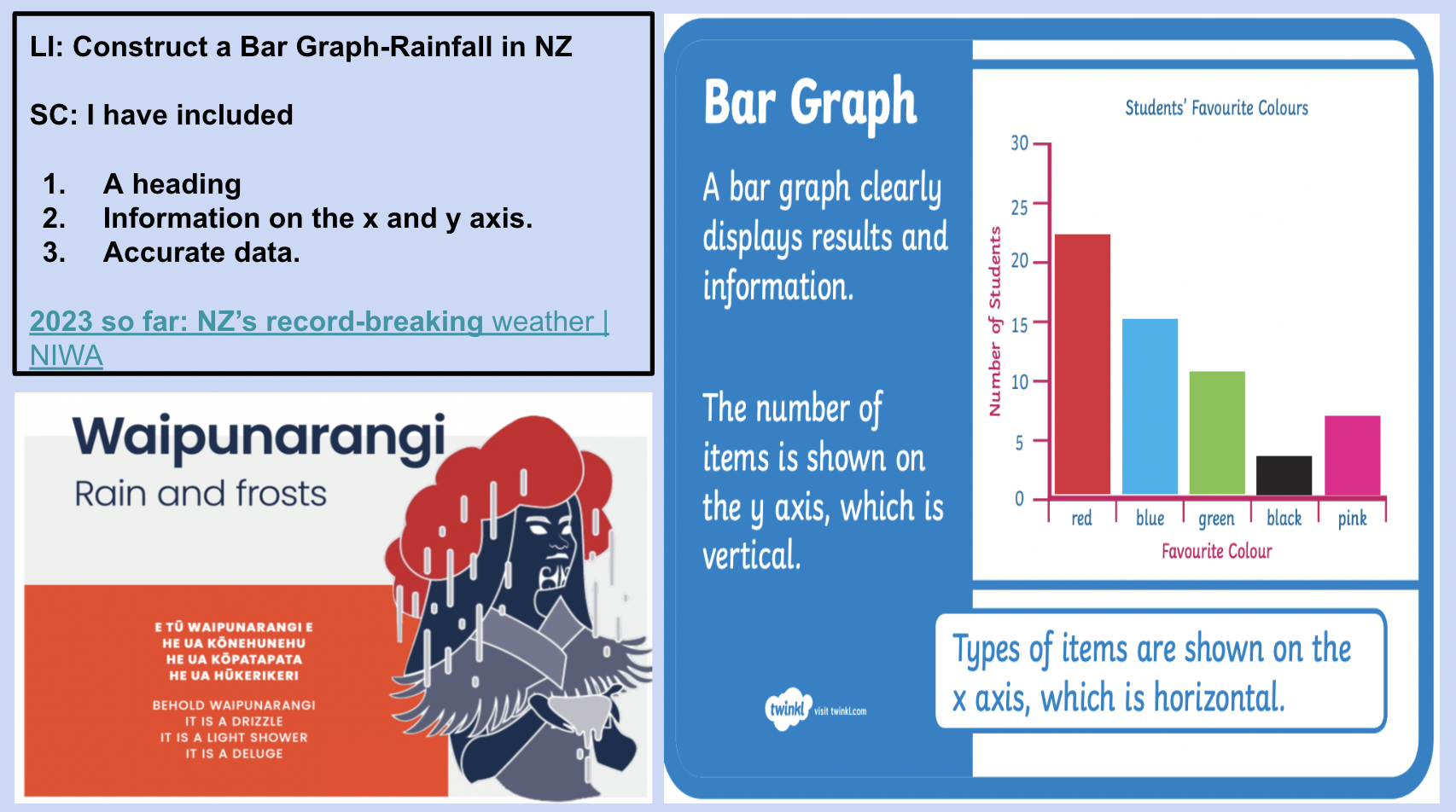
-
Kia Ora Students
EXPLORE / TŪHURA learning intentions:
- We are EXPLORING... our actions in the environment by investigating water resources.
Success Criteria
State and illustrate each part of the water cycle.
Describe each stage with examples.
Identify the 3 main water sources in Auckland.
Conduct an experiment and explain the results.
Google Classroom - Link to Activities

- We are EXPLORING... our actions in the environment by investigating water resources.
-
Kia ora Students
PLAN & DO / WHAKAMAHI learning intentions:
- We are PLANNING...to investigate how our actions can influence and determine the quality of our local water.
Success Criteria
Test for the Ph balance, phosphates and nitrates in the water.
Describe the physical features of good and poor water quality.
Explain how poor water quality affects the surrounding ecosystem.
Name the stages in the water purification process.
Identify the main sources of water.
Auckland Water care Supply: Google Classroom - Link to Activities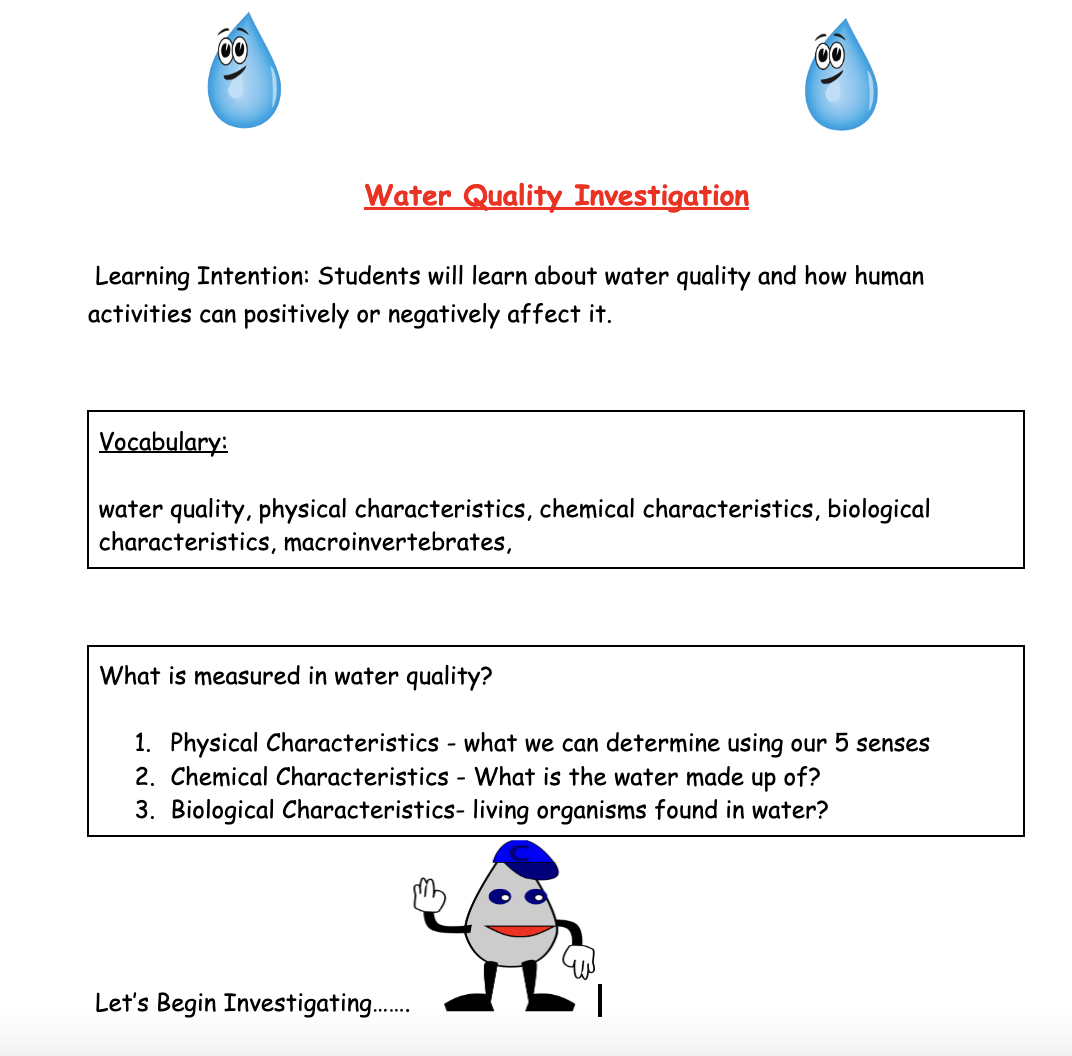
- We are PLANNING...to investigate how our actions can influence and determine the quality of our local water.
-
Kia ora Students,
We are focusing on the context “Kotahitanga” by identifying and explaining the processes involved in the supply of water.
Success Criteria
Name the stages in the water purification process.
Compare and contrast the water supply levels in the Auckland dams.
Identify the main sources of water.
Describe the benefits of water storage.
Predict and outcome and justify my answer with evidence
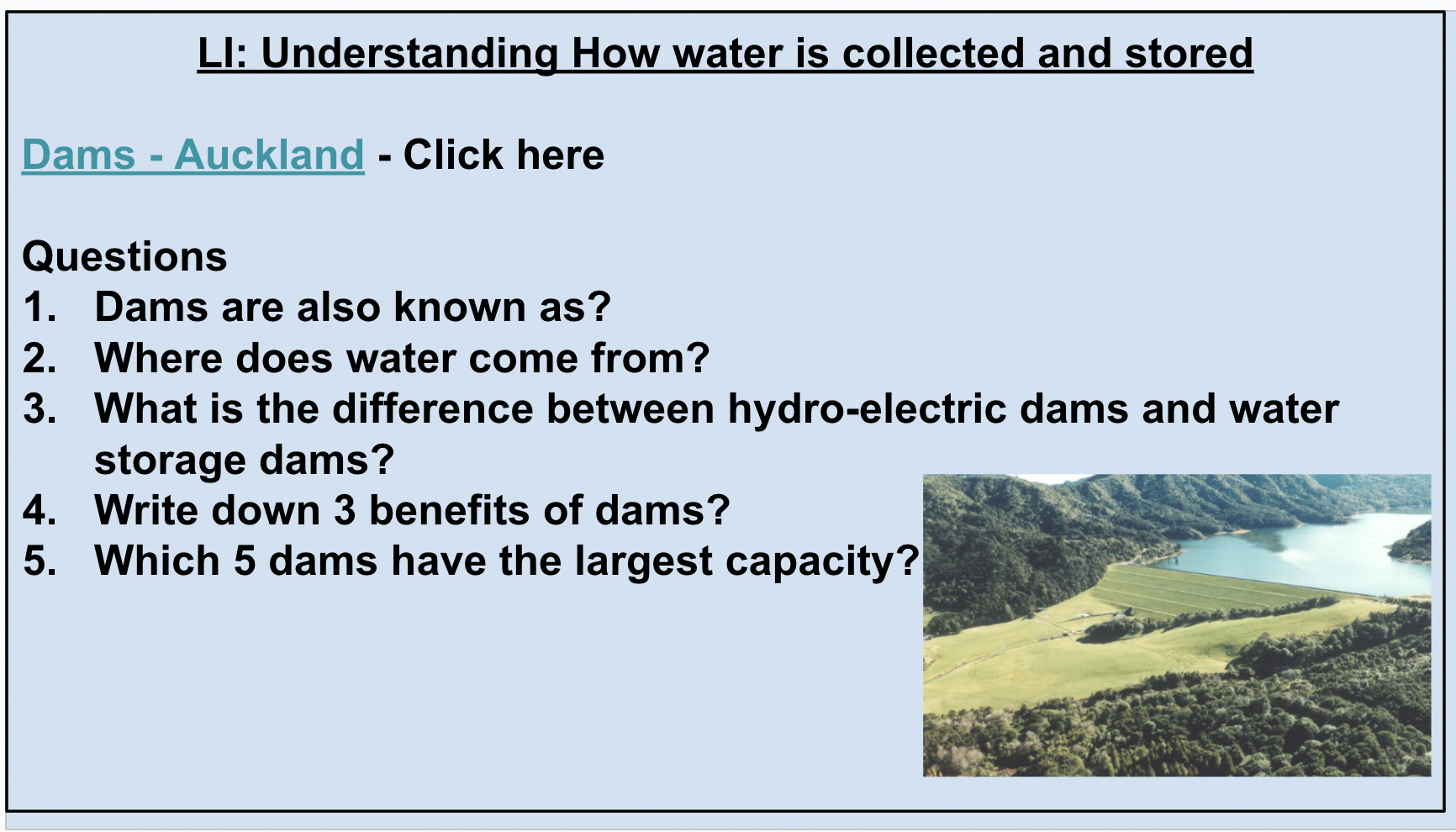
-
Kia Ora Students,
You will be working on your assessments for the next 2 weeks.
PLAN & DO / WHAKAMAHI learning intentions:
- We are PLANNING...to apply our knowledge of the water cycle so that we can...explain the effects of climatic conditions(droughts/floods) on the environment and the economy.
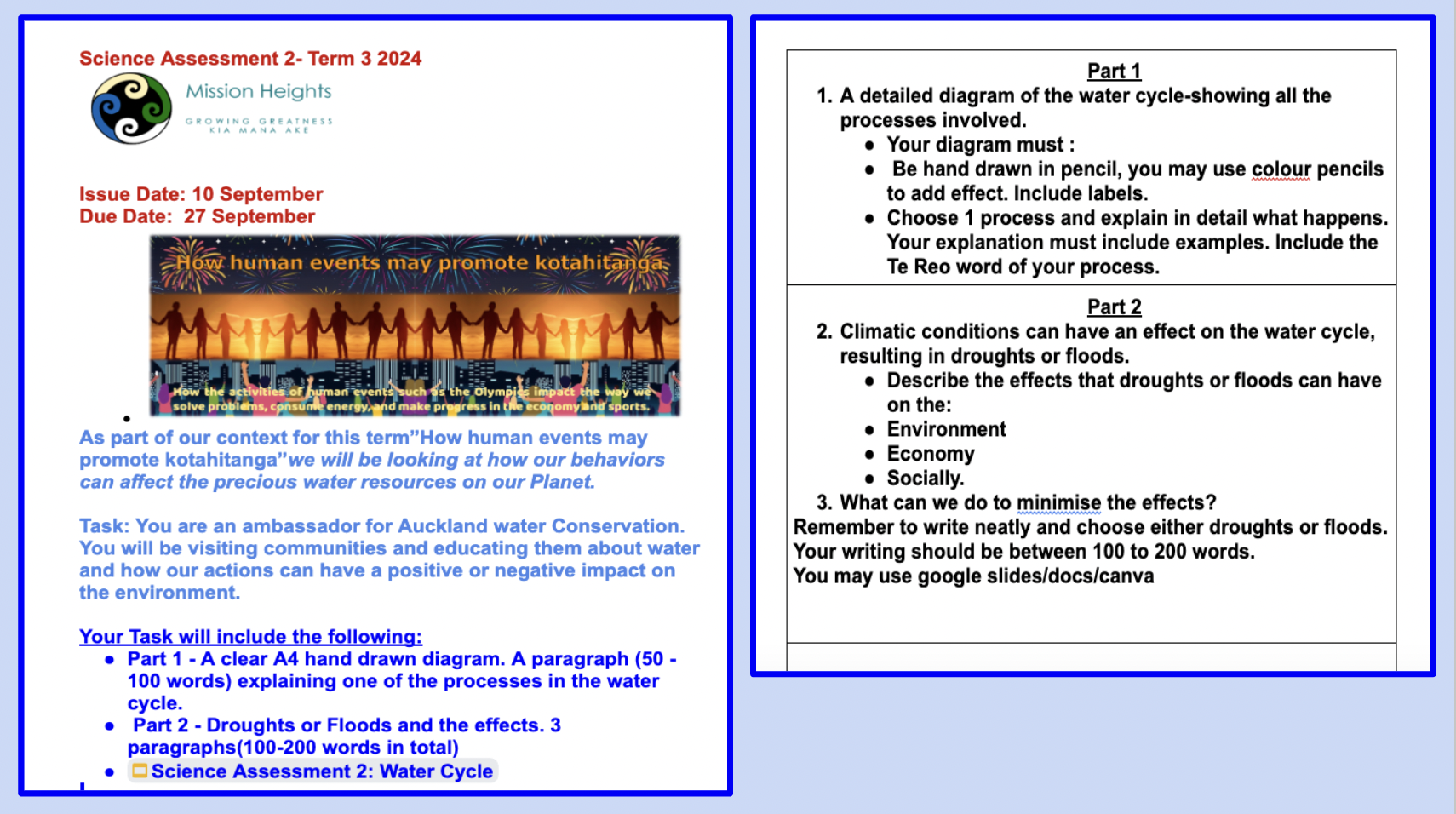
Google Classroom - Link to Activities
-
Kia Ora Students,
You will be working on your assessment this week.
PLAN & DO / WHAKAMAHI learning intentions:
- We are PLANNING...to apply our knowledge of the water cycle so that we can...explain the effects of climatic conditions(droughts/floods) on the environment and the economy.

Google Classroom - Link to Activities
-
SCHOOL HOLIDAYS
-
SCHOOL HOLIDAYS
-
Kia Ora Students,
Welcome back to term 4.
EXPLORE / TŪHURA learning intentions:
- We are EXPLORING... the context of celebrating diversity by investigating the changing states of matter and materials in the world.
- Success Criteria
1. Use a dictionary to locate new scientific vocabulary.
2. Hypothesise before conducting an investigation.
3. Draw and label accurately, with descriptions.
4. Describe what soluble and insoluble are, inclusive of examples.
Google Classroom - Link to Activities
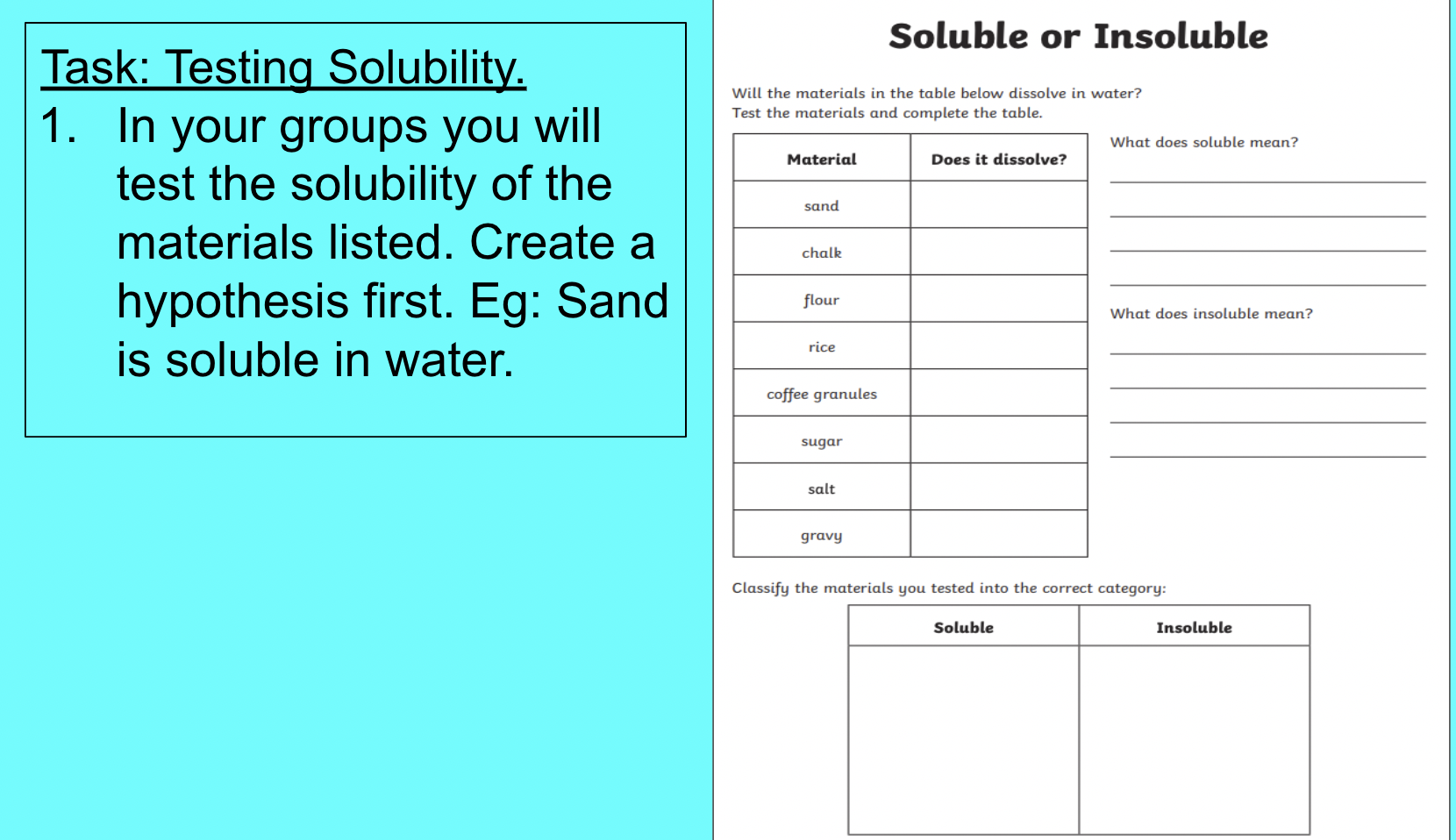
- We are EXPLORING... the context of celebrating diversity by investigating the changing states of matter and materials in the world.
-
Kia Ora Students,
EXPLORE / TŪHURA learning intentions:
- We are EXPLORING... the context of celebrating diversity by investigating the changing states of matter and materials in the world.
- Success Criteria
Draw and label accurately, with descriptions.
Compare materials and rate of dissolving.
Analyse results and draw conclusions after completing investigations.
* Google Classroom - Link to Activities
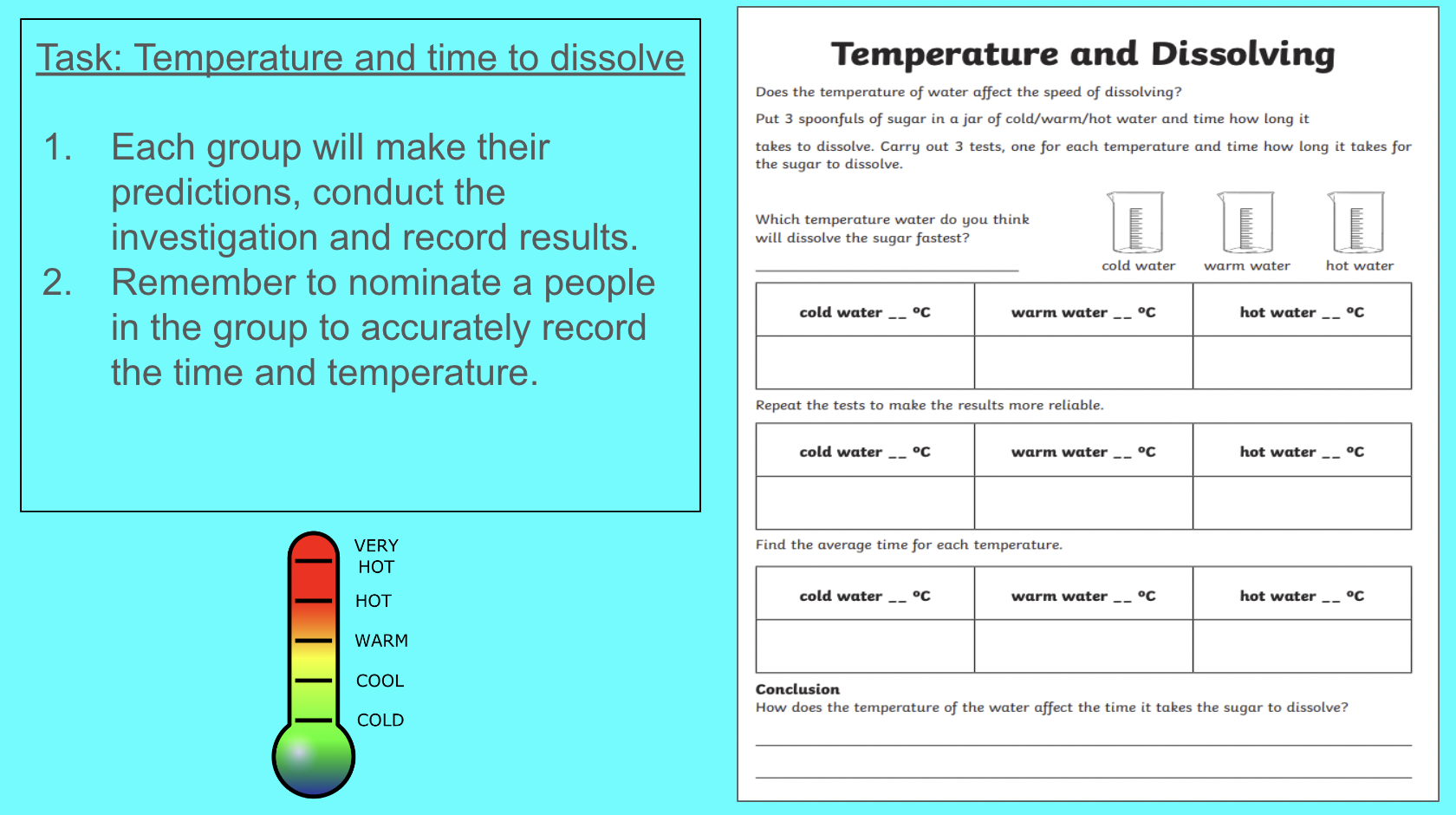
- We are EXPLORING... the context of celebrating diversity by investigating the changing states of matter and materials in the world.
-
Kia Ora Students,
EXPLORE / TŪHURA learning intentions:
- We are EXPLORING... the context of celebrating diversity by investigating mixtures in their solid, liquid and gas states.
- Success Criteria
- Define what a mixture is and give examples.
- Explain the differences between mixtures and solutions.
- Identify the factors that speed up/slow down the dissolving process.
- Conduct a practical by following instructions and write down observable results.
Google Classroom - Link to Activities
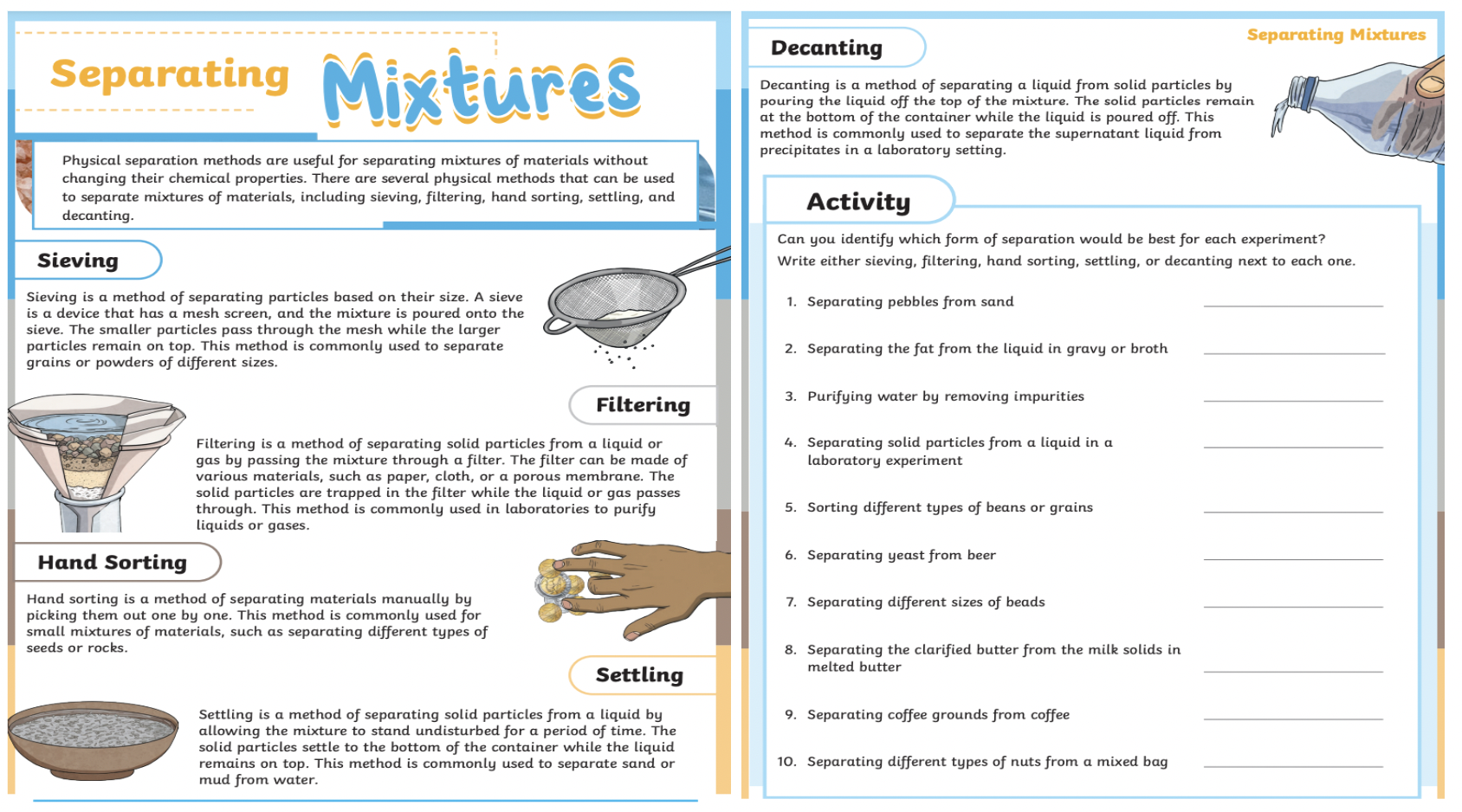
- We are EXPLORING... the context of celebrating diversity by investigating mixtures in their solid, liquid and gas states.
-
FOCUS / ARONGA learning intentions:
- We are FOCUSING...on the context of celebrating diversity by observing mixtures and identifying their properties.
- Success Criteria
I can describe the physical properties of mixtures (e.g., solubility, particle size) and how these properties allow for their separation.
I can select and justify an appropriate method to separate a mixture (e.g., filtration, distillation, evaporation).
I can analyse the results of my experiment and draw conclusions about the properties of the substances in the mixture.
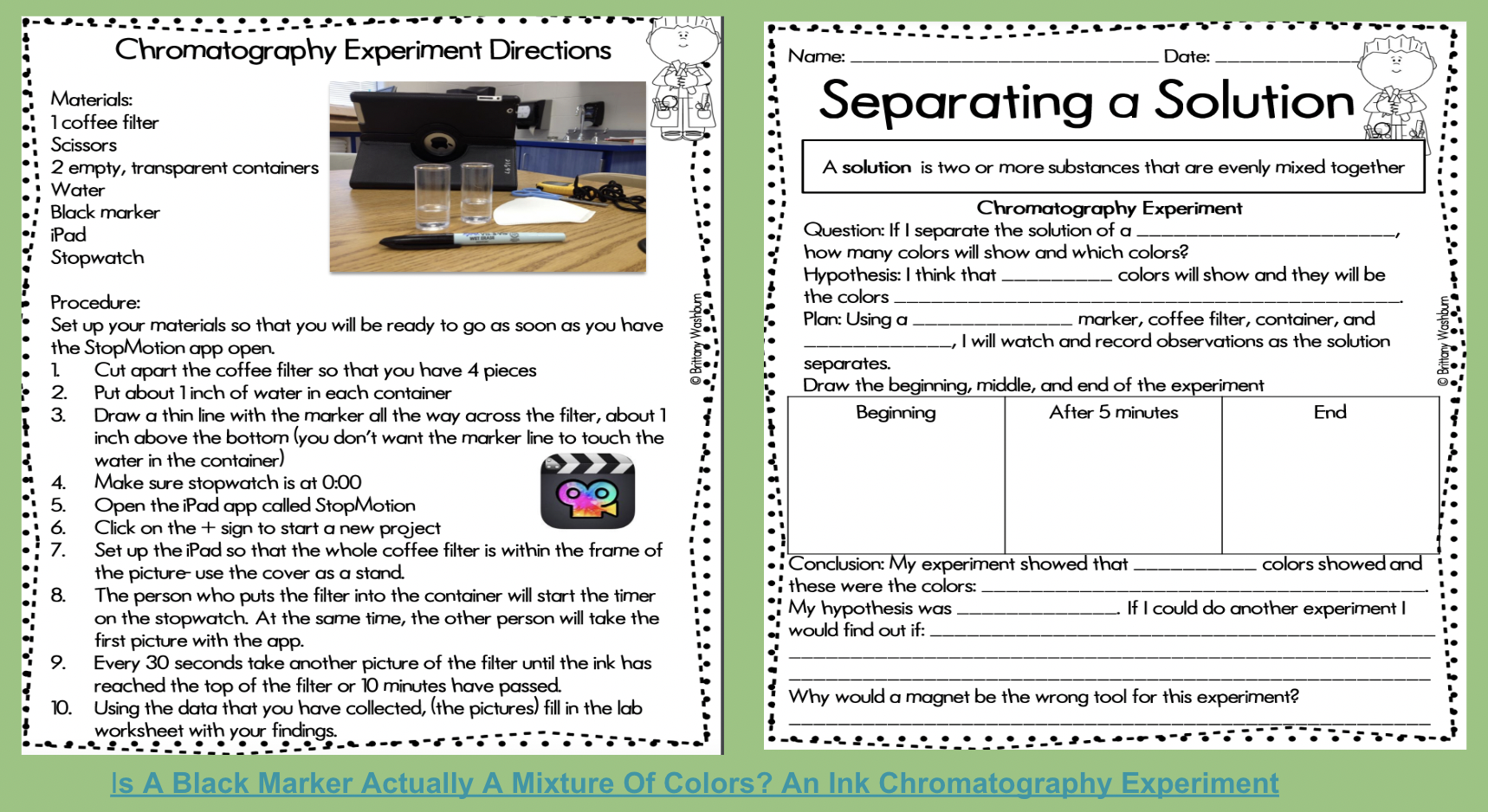
- We are FOCUSING...on the context of celebrating diversity by observing mixtures and identifying their properties.
-
EXPLORE / TŪHURA learning intentions:
- We are EXPLORING... the context of celebrating diversity by investigating the human eye to understand how the eye, with its unique variations and universal features, serves as both a symbol of individuality and a reflection of our shared human experience.
- Success Criteria
I can identify/label the parts of the eye.
Describe the functions of the part of the eye.
Explain how light enters the eye.
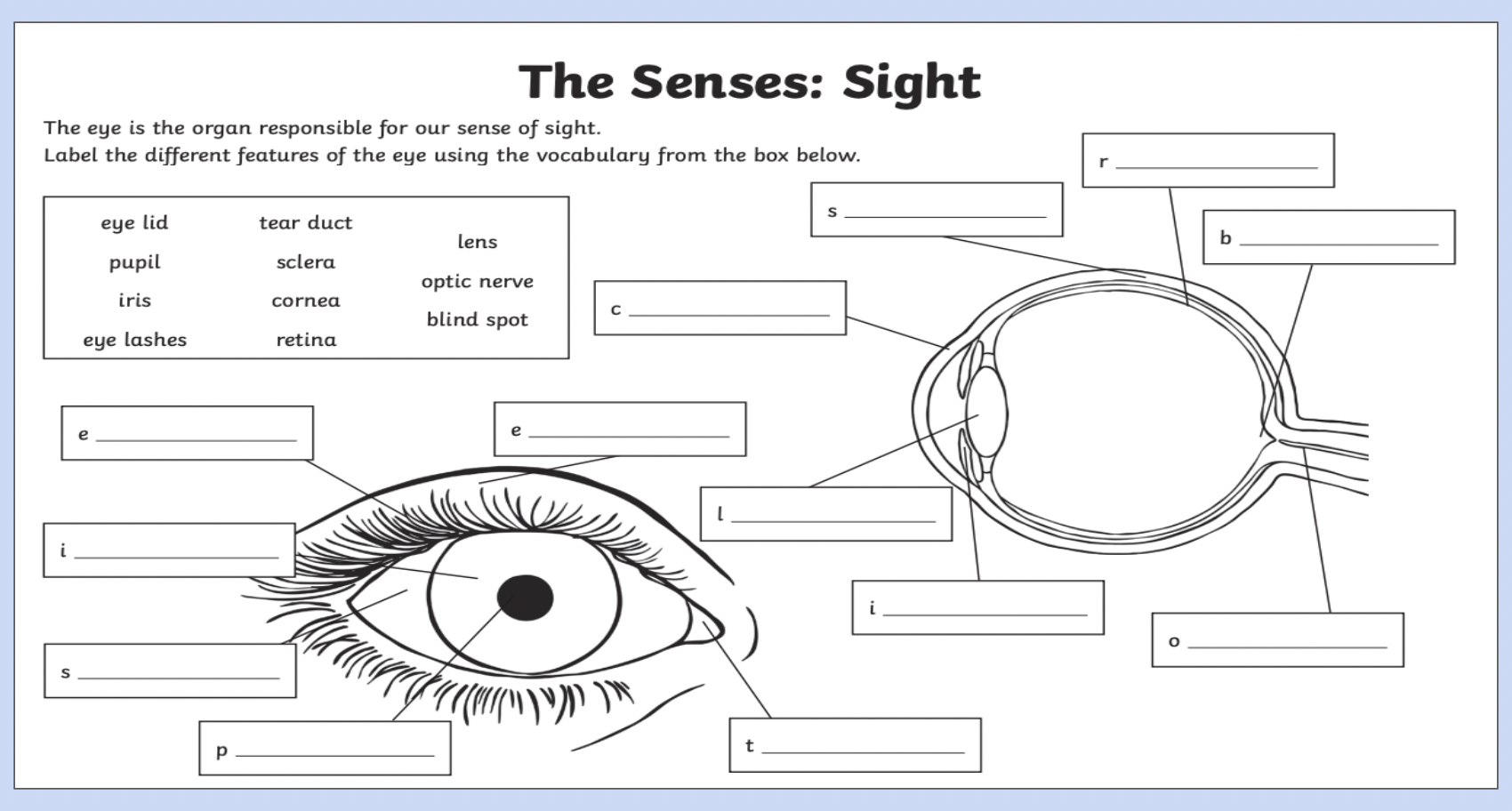
- We are EXPLORING... the context of celebrating diversity by investigating the human eye to understand how the eye, with its unique variations and universal features, serves as both a symbol of individuality and a reflection of our shared human experience.
-
Kia Ora Students
FOCUS / ARONGA learning intentions:
- We are FOCUSING...on the context of celebrations & diversity by researching and presenting facts about the eye, recognising how different perspectives and biological variations contribute to human uniqueness.
- Success Criteria
Find and select reliable sources to gather factual information about the eye.
Explore and explain how the eyes vary among individuals, cultures, or species, and discuss the significance of these differences.
Present my research in a clear and organised way, using visuals, examples, or diagrams as needed.
Reference the sources of my information correctly.
Google Classroom - Link to Activities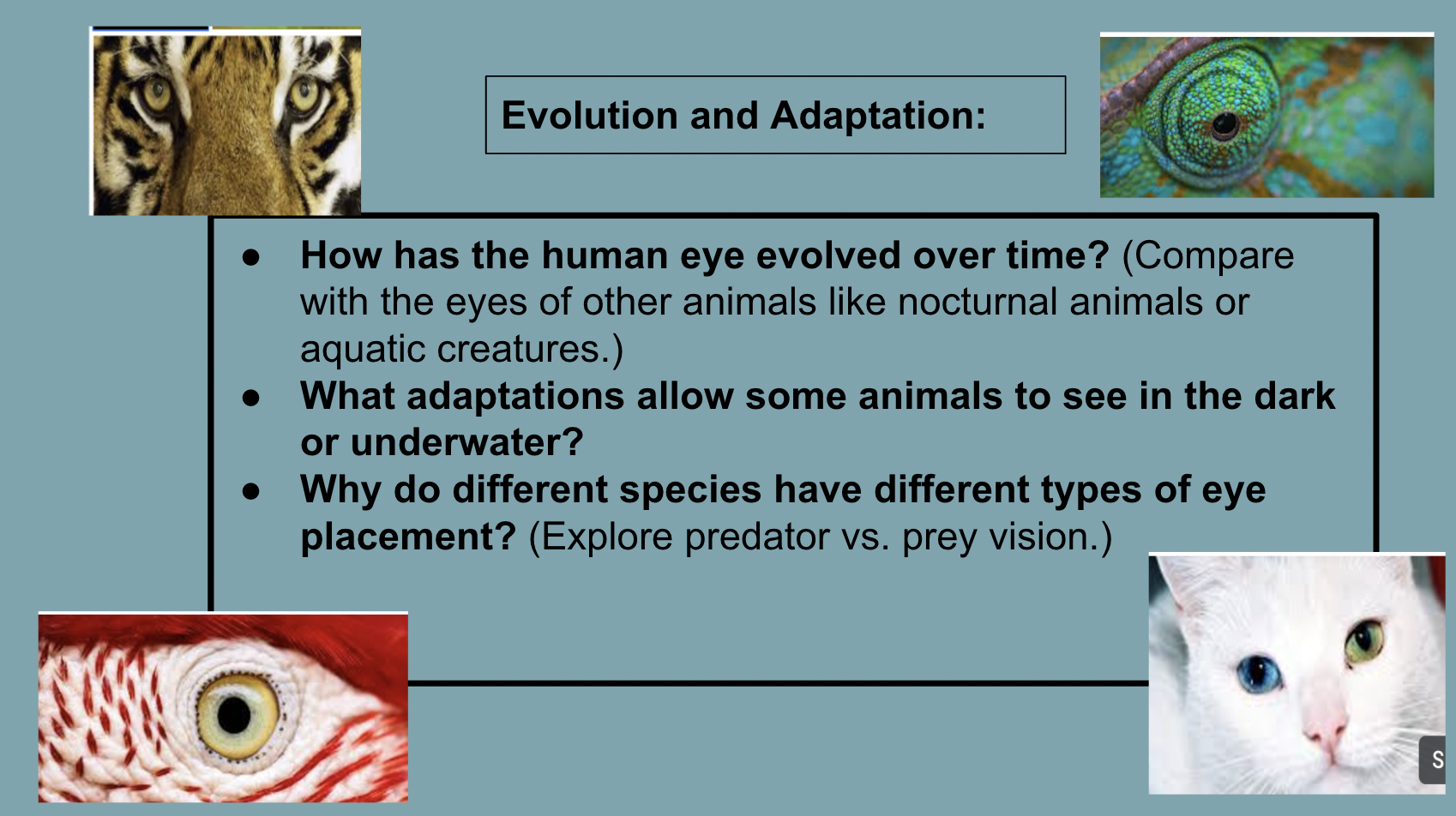
- We are FOCUSING...on the context of celebrations & diversity by researching and presenting facts about the eye, recognising how different perspectives and biological variations contribute to human uniqueness.
-
Kia Ora Students
FOCUS / ARONGA learning intentions:
- We are FOCUSING...on the context of celebrations & diversity by researching and presenting facts about the eye, recognising how different perspectives and biological variations contribute to human uniqueness.
- Success Criteria
Find and select reliable sources to gather factual information about the eye.
Explore and explain how the eyes vary among individuals, cultures, or species, and discuss the significance of these differences.
Present my research in a clear and organised way, using visuals, examples, or diagrams as needed.
Reference the sources of my information correctly.
Google Classroom - Link to Activities
- We are FOCUSING...on the context of celebrations & diversity by researching and presenting facts about the eye, recognising how different perspectives and biological variations contribute to human uniqueness.
-
Week 8 and 9
EXPLORE / TŪHURA learning intentions:
- We are EXPLORING... the context of diversity by identifying the parts and use of the ear.
- Success Criteria
Draw and label the ear.
Describe the functions of each part of the ear.
Explain how sound travels from the vibrations to the ear.
Explain how sound is interpreted by the brain.
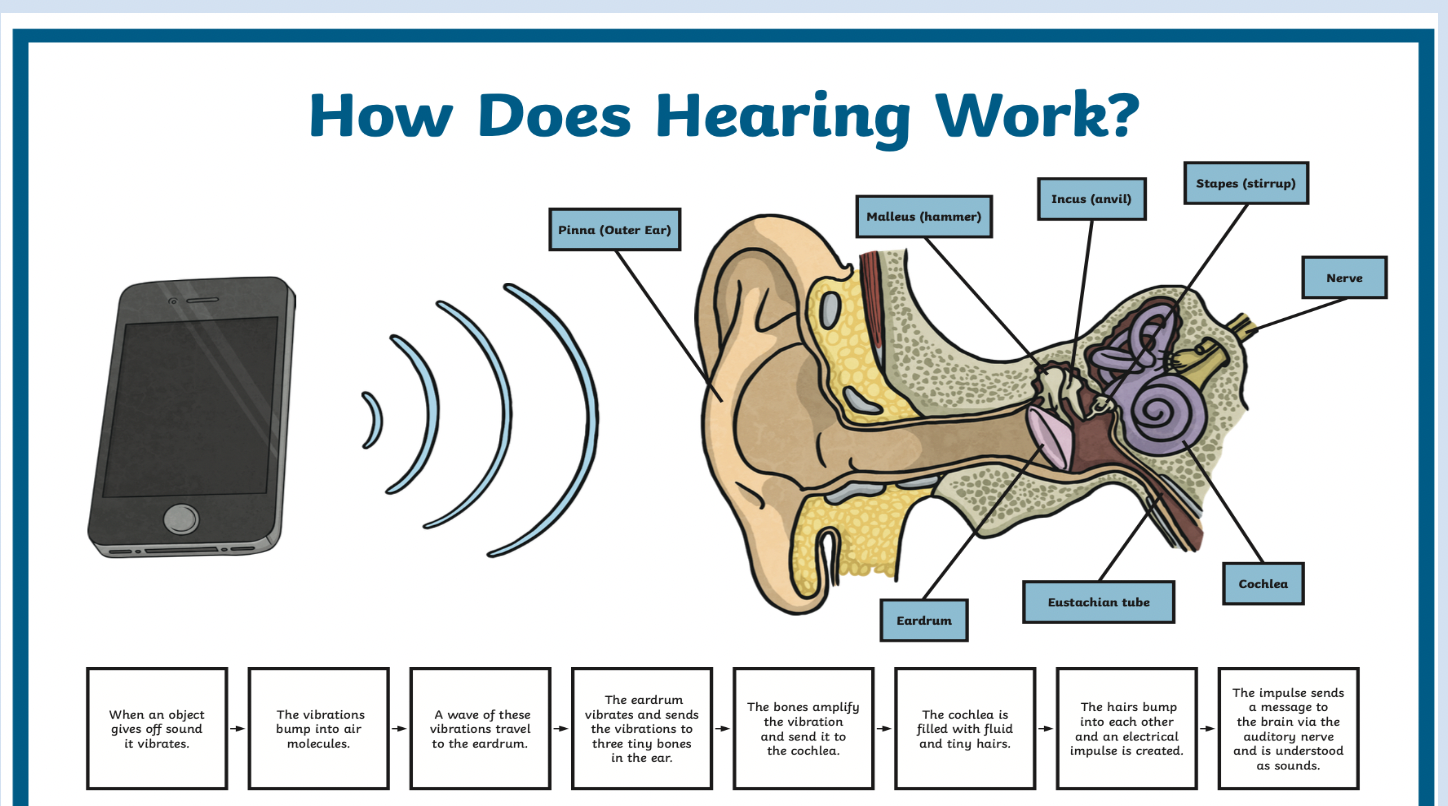
- We are EXPLORING... the context of diversity by identifying the parts and use of the ear.

